#sometimes it doesn't have to be a redemption arc
Explore tagged Tumblr posts
Text
SY and SJ sharing body shenanigans
I like how sometimes in fics, SY retels anime or famous story plot but with some renditions. It's fun to spot references
So, consider this. SY is trying to kickstart scum villain redemption arc before it's too late, so he tells a story of a young scholarly cultivator. She is a student of famous immortal and lives in Imperial city. Girl is talented and smart, exceling both in her cultivation and scholarly studies. But she lives like a hermit, doesn't really socialize with anyone, and communicates either with her little assistant or shizun. One day, she accidentally finds a prophecy of doom that should happen during the closest Summer solitice festival. One immortal, who turned on the path of demonic cultivation and wanted to put the world into eternal night, was sealed on this day, and a thousand years later, they shall come back. She tries to warn her shizun about upcoming disasters, but her shizun dismisses her worries and sends her to the small village to take care of organizing this year festival. And most importantly, have fun and make new friends. She could care less about that when catastrophe is near, and she needs to get ready in case seal formation really breaks.
But she obliges as a filial disciple and gets to the village. She organizes festivals and meets a lot of new people. Reluctant, she gets to know five of them a little better, but the festival is near, and she needs to find answers and make a plan. Instead of that, she couldn't sleep nor find anything because of an unexpected welcoming celebration in her house, what really gets on her nerves. And the night has come. The prophecy was right. the cultivator breaks the seal and comes back to the festival. Meanwhile, her shizun that should lead the celebration is gone. Now, somehow, young cultivator should stop them, but not without the help of her new acquaintances.
And yes, you guess it right, that's the plot of My Little Pony. Shen Qingqiu is gonna learn that friendship is magic, whether he wants it or not.
#sy: do you think lqg is rainbow dash or applejack? like he's honesty brutal#but still loyal as well#but judging only by looks#he would be rarity for sure#and sect leader is probably Celestia?#though he absolutely fumbles when it's about you#i thought it was a blackmail from your side but i have seen no traces of that#so now i'd say it's shining armor#big brother vibe 10/10#sqq: What the hell are you talking about#sy: oh right we haven't reached the wedding arc#sqq: *sigh*#svsss#scum villain self saving system#scumbag self saving system#shen qingqiu#original shen qingqiu#shen yuan#sharing body au
85 notes
·
View notes
Note
Hi mod ^^
I like your mlb analisis.
What is your opinion about Chloe?
Do you think her redemption in season 2 was wasted?
Do you hope for her to have a good redemption arc?
mod? I don't know the reference there.
Thank you!
Chloé? She's my favorite ML character due to the sheer depth and versatility of her character and situation. Most characers are fairly well pigeon holed into their roles. This isn't a bad thing! Sometimes you need clear cut spaces to keep things organized. However Chloe has always been a character uniquely poised to go in multiple directions. There is never a time when her being on screen is boring. It might be *painful* but it's not boring.
I'm also a big advocate for heightening awareness of child abuse and she is a PRiME character for that. She is the perfect 'bad victim' to teach kids with. Not everyone who is hurt is sweet and sad about it. Some people take all their pain and lash out with it. Yet they are *still* children and they *still* need help.
They've waited WAY too long with her arc for it to have been a good idea to put a twist if they're going to do something positive with her. Like, they still might do it, but they missed the window to have it be a real impactful arc. They needed her to be a villain because no one else brought the same energy, and so stalled her for S4&5. I say needed, I mean 'they were too lazy to work a way around it'.
They also wanted to cram all the 'endings' together for the end of S5/finalé, so they kept pushing it off. Bad pacing, old outdated writing methods.
I don't really *hope* for anything. I *want* her to get help, and to get out of her abusive situation. I want what she was put throughby both parents(and the villains) to be recognized. She doesn't need to be a hero, or good, or a main character. We just need to admit to the child being tormented and cruelly manipulated by the adults.
22 notes
·
View notes
Text
ok but what if neve and lucanis get together during datv, break up because they're both working through their damage on top of having a fuck ton of new stressful responsibilities, and don't see each other for a year, two, five?
they try to write messages to each other, but - they're both important people. they just don't have time. they might share stories once in a while through the post, sure, but any important things they have to say to each other... it's difficult to write it all down properly, in ink on paper like that. most attempts perish as crumpled parchment thrown into a fireplace.
there's a stretch of many months, maybe even a full year, when they don't hear from each other at all. until SOME twist of intrigue brings them elbow-to-elbow in the shit again.
I think for Lucanis it's a surprise, that he can feel some glimmer of ease again when he's around Neve (she was always the one who could make him feel safe, comfortable). The time since the veilguard has been nothing but the stress of carrying on the Dellamorte name and answering to Caterina's expectations and trying, trying so hard, to be who he needs to be as First Talon - putting his head down and slogging through all the parts of the job that he hates, dreads, never wanted in the first place.
I think for Neve it's a bit of a shock, because she actually does not recognize him immediately. and it's not because he's changed his appearance - he still wears his hair in that neat mullet (though now with some gray in the black), dresses smartly in crow leathers, keeps his beard trimmed. truly the way he carries himself hasn't changed that much either (he's always been guarded, careful). but his face. his eyes.
Neve remembered relishing every unguarded glance she caught from him. those eyes that shone so brightly in the light of the kitchen candles when they were both up at ungodly hours. even though he had seen so much pain and misery and death, Lucanis' eyes showed his heart; still soft. open. welcoming. easy. dark and warm like shadows cast by firelight.
when she sees him for the first time in years, those eyes are cold. hard. closed off. even though he slept so little at the lighthouse, Neve can't help but feel that she has never seen him look so, so, so tired.
and i think it likely doesn't take long for Neve, greatest detective in Thedas, to see the way he interacts with the other Talons, with Teia and Viago, with Caterina - and put together exactly what's been going on. And I think she'd stop at NOTHING to try and fix what she sees as a terrible mistake made by the veilguard, including her. they aren't to blame, of course not, how could they have known? but even so - when the veilguard ended, Lucanis was left to the snakes and the dogs.
so maybe she makes a pact with Teia and Viago, who had almost given up on Lucanis when Neve showed up again. maybe she finds a surprising ally in Illario, who has always known what First Talon would mean for Lucanis. maybe she calls on Davrin, Rook, anyone else from the team who might be able to help. one things for sure tho. Neve and Caterina fucking hate each other.
and then neve and lucanis kiss
#sometimes pitting two girl bosses against each other is ok actually#honestly i think illario becoming first talon could actually be sick#the traitor crow becomes the first talon#what a twist#datv#datv spoilers#dragon age#veilguard#lucanis dellamorte#caterina dellamorte#illario dellamorte#andarateia cantori#viago de riva#nevecanis#neve x lucanis#there is a scene where viago saves neve from poisoning#and honestly caterina doesn't have to stay a villain#she can have a redemption arc#house husband lucanis dellamorte#i want to see that man kneading bread#also neve and lucanis don't HAVE to kiss#but i think it would be sweet#maybe he goes on to travel for a few years#and then shows up at neve's doorstep with a loaf of bread and some fried fish from hal#or maybe breaks into her house and she comes home to him making her dinner#idk they make me ill
94 notes
·
View notes
Text
favorite type of villanous characters are the ones whose motivations boil down to
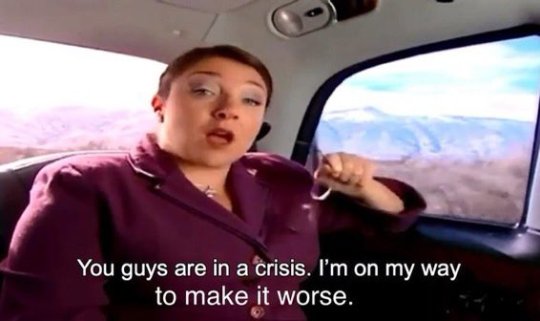
like they dont even have to have any stakes in the broader situation. they just have take pleasure in destruction
#sometimes this can be done in a very funee cartoon villain kind of way a la spike from buffy#and sometimes it can be done in a positively chilling way where this character knows for a fact that some of the effects of their chaos#will also make their life worse. but they just enjoy fucking with other people more than any privation they could personally experience#you can't sway this person with common sense because their own personal logic dictates that it doesn't apply to them#you can't sway them with emotion; your sadness/fear/anger/ineffectuality is part of the entertainment factor#can't sway 'em with threats because dodging threats is ALSO part of the whole point#this second version is the least pathetic type of character mostly because they simply do not give a shit about anything ever#any personal fears are buried or stomped out and figuring out why they do what they do won't stop them from doing it#and yet: in order to keep the relentless making-it-worse guy from being uninterestingly evil there does have to be SOME desire or need#bodily harm or lack of available victims could get you a moment of genuine terror or loneliness that sparks the audience sympathy#which you do need! just long enough for the sympathy to then be misplaced. which you also need bc this is an antagonist#the first version does very well at redemption arcs and is sort of built for them . they're almost too easy for the first cartoon version#the second version should be kept separate from redemption arcs at all costs#or you no longer have that character anymore now he's someone else#writing tag#q#god. one thing is that i know how to spot character types in writing and detail what's good about them and talk about it#but when it comes to then executing the concept? my perception of what's cool and works and my execution are MILES apart#frustrating as hell that i can identify this guy but not create him
14 notes
·
View notes
Text
I just really can't stop thinking about how Dacre had curls and blonde highlights and an eyebrow slit and then mysteriously it seems as if all of that is now gone 🤨
#i am insane#i know and i accept this reality#and i will continue with the delusion!!!#the speedo photoshoot with the red and white almost lifeguard gear???#Dacre was either giving us a sneak peek/hint or is truly a cruel cruel man#and i don't think he's cruel#the interview where he talks about having a notes box pinned on the background of his mac that says “what would billy do”#he loves him just as much as we do#also the interview where he said Billy's death was the START of his redemption arc?????#how can anything START if you're DEAD?? like in storytelling unless we're going to the afterlife or some shit how the fuck#how the fuck is your character arc continuing huh??? dacre????#dacre my beloved#billy my beloved#billy#dacre#clowning#if billy doesn't come back it will be my personal Rep TV moment even if i sometimes clown for rep TV this will take over
2 notes
·
View notes
Text
If I got a nickel every time a cartoon I love
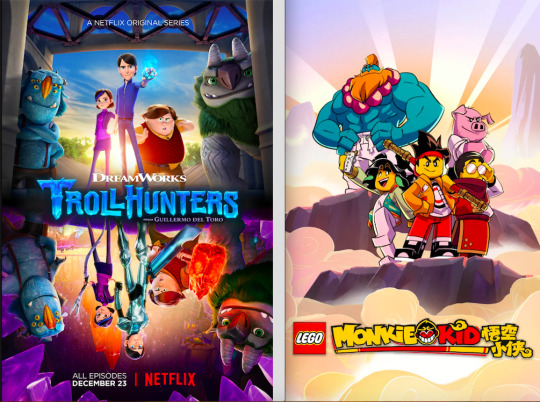
based on a book

based on mythology
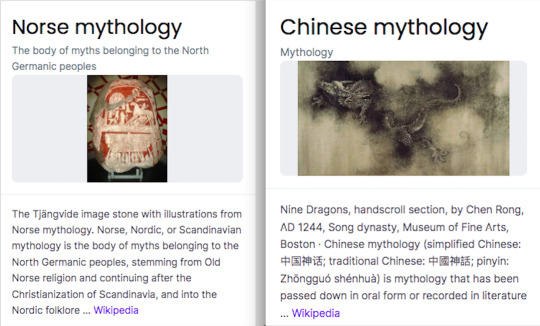
about a teenage boy

who stumbles upon an ancient artifact that gives him powers
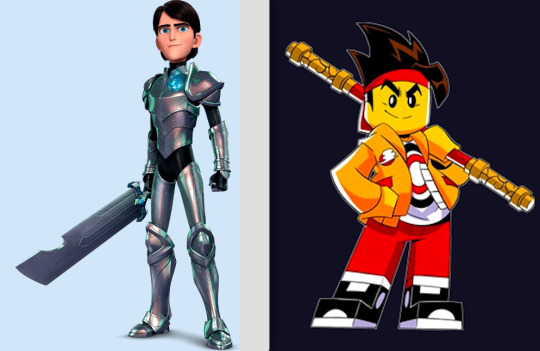
that's being sought by this cocky guy with daddy issues
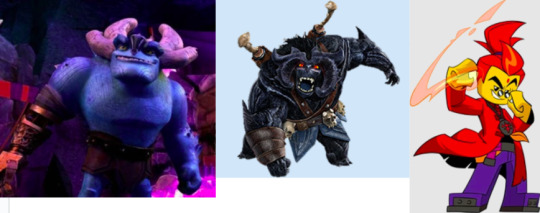
who's right arm is mechanical some of the time
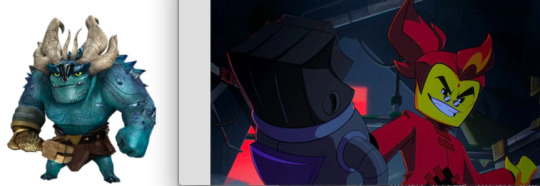
and his Dad is this massive guy with big horns (and sometimes glowy blue eye(s))

who's being manipulated by a powerful woman

that he freed from her centuries old prison

who may have had noble ambitions in the past, but now has been consumed by power

and the woman possesses a young girl in order to get what she wants

and sacrifices the lives of her minions in order to unleash her ultimate weapon ->
(Dozens of Gum Gums) (Spider Queen, Huntsman, Syntax, Goliath, Not- Mayor) You know what I'm talking about :(
and she's got this indentured servant *cough Slave cough* (with pretty gold eyes 😘)

who she refers to as "Her Champion"
who travels using shadows (I could not find a single picture of Angor Rot using his shadow staff)
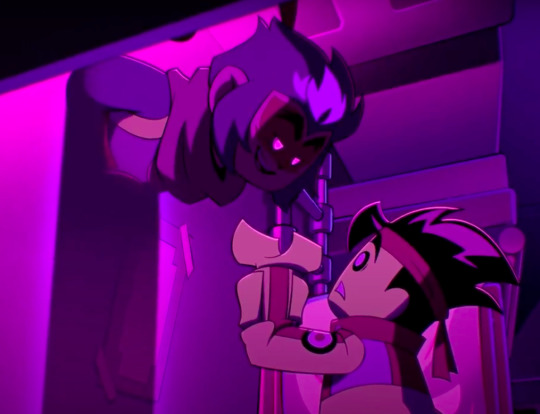
who was really sweet and kind in his past but then... well... stuff happened
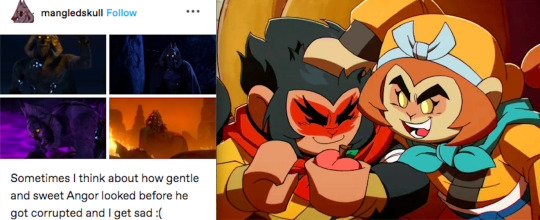
and has lost his right eye
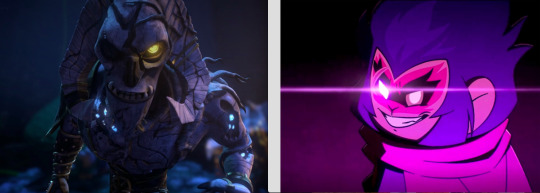
and he's been killed before

but the big bad restores him back to life so she can use him

and he gets a redemption arc at the end of season three

and the main character doesn't have a bio Dad, but he attracts plenty of father figures throughout the course of the show
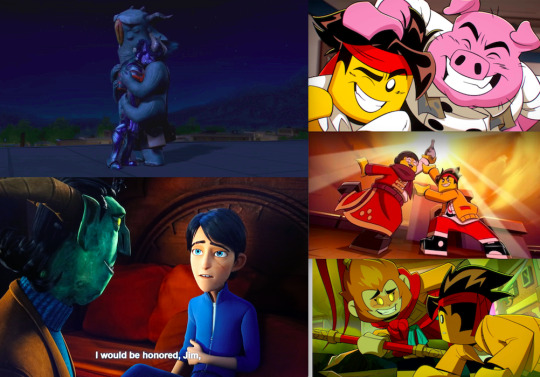
and he gains a non-human form that makes him even more powerful

and him and the others gain an armor upgrade at the same time

and the girl of the team has short black hair with dyed stripes

and you know the guy with daddy issues who wanted to steal his artifact in the beginning? He becomes one of the protagonist's closest friends

and there's this gentle giant character
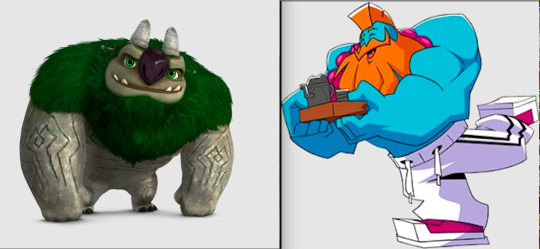
who becomes one of my most beloved characters of all time 💕💕💕

and he has a history of violence and trauma

and has now vowed to be a devote pacifist

but breaks his vow in order to protect the people he loves (with angry glowy eyes to boot)

and has a deep love for cats (yes, I did just do that)

...then I would have two nickels.
Which isn't very much, but it's weird that it happened twice, right?
(That last drawing was made by @jezfez81. Thank you for letting me use it!)
What the heck happened?!?! This was just supposed to be a comparison between Sandy and AAARRRGGHH!!! Where did all these comparisons come from?!?!?!?!?! WHAT THE HECK HAPPENED?!?!?!?!?!?
(this took way too long to make, please give it some love :3 )
#trollhunters#lego monkie kid#lmk#tales of arcadia#monkie kid#mk#jim lake jr#mei long#lmk mei#long xiaojiao#qi xiaotian#claire nunez#steve palchuk#walter strickler#do you know how hard it was to find images of Strickler and Jim where they're NOT trying to kill each other??#that was probably my first clue that their relationship... isn't exactly healthy#toby domzalski#toa strickler#trollhunters strickler#toa#lmk season 4 special spoilers#this took far too long#draal#lmk xiaotian#monkie kid xiaotian#lmk mk#toa trollhunters#james lake jr#jttw#journey to the west
2K notes
·
View notes
Note
What are your thoughts on the possibility of Petunia redeeming herself or atoning for her abuse of Harry? This is more ramblings and musing then coherent ask, sorry.
You mentioned in a previous post that while she might not love him, she is concerned for her nephew’s safety - as well as that her emotions towards Harry are quite complex (similarly to her emotions towards and relationship with Lily, post-magic revelation).
There are many fics where Petunia does eventually break the cycle of abuse she and Vernon perpetuate on Harry (but usually this is the result of either divorcing Vernon or her husband outright dying), but I’m kind of curious as to what you think in your analysis of her character.
Petunia is a tough nut to crack for me when it comes to fics where she is redeemed.
At the very least, the extreme neglect and enforced silence that Harry is raised in just…it’s terrible when you look at it more deeply than the early books intend.
Which is made worse still by later on, when she swings a frying pan at his head (Chamber of Secrets, I think?).
In the first books, I get that as the target audience was young kids, not much gravitas was placed in Harry’s treatment in the hands of the Dursley’s - they were the bad family he escaped into the magical world from, the anti-thesis to the Weasley family later, meant to seem more caricature and buffoonish.
If that frying pan had hit Harry, though? Depending on how hard Petunia swung it, no matter that she was concerned for Dudley (after Harry didn’t even use magic, just pretended to), that could have killed him.
We know Dudley beat Harry quite often with his friends, and Vernon at the very least threatened to do so (and from some of Harry’s lines, likely went through with said threats at times), but little about Petunia’s abuse of Harry is mentioned except in the very early books - her shaving his hair except for his bangs for example, leaving him to go to school mortified - so there’s no indication that she regularly threatened him physically over the emotional abuse, but still.
Not to mention the potential for neglect/abuse that Petunia herself went through, Lily being their parent’s favored child over her, how that in turn also affected her relationship with her sister, and then how that is turned on to Harry…
Petunia’s character, and redemption/atonement for Harry’s abuse is such an interesting concept.
Personally, I was never interested in a Petunia redemption arc. I think she's just as bad, if not worse than Vernon. So I'm going to have to disagree with you.
It's not that Petunia's sitting there feeling bad about how she and Vernon treat Harry and wish she could stop it — she doesn't. It's very clear throughout the books that she isn't remorseful at all.
Her feelings about Harry are complex because Harry is Lily's son. And as bitter and jealous as Petunia is, I think, she used to love her sister. Used to even be protective of her. So, deep down, I don't think she wants Harry dead or seriously hurt (to her standard), but at the same time, she feels justified in hurting him and treating him as subhuman.
See, Vernon truly does hate wizards. He fears magic, he loves normalcy, and he despises the "freaks" that essentially represent everything he hates. He's straightforward and completely honest in his approach.
The reason I sometimes consider Petunia worse, is becouse she isn't honest, she's a fucking hypocrite.
She wanted to be a witch. She wanted to be special and go to wizard school like Lily. She was jealous of Lily that she got to do magic and go to Hogwarts.
Petunia started calling wizards freaks and latched onto normalcy as a way to cope with not being special. I mean, she was told that magic exists, that there's a whole special world of magic out there, but that she isn't special enough to become part of it.
So young Petunia coped by going in the opposite direction. She became as normal as can be. Started claiming anyone special was a "freak" even when deep down she fucking knows that if she got a chance she'd leave and go to Hogwarts in a heartbeat. That deep down she wants to be special.
She transferred that jealousness and bitterness, then toward the wizarding world as a whole onto Harry personally, which is so unfair. Like, I find it disgusting, I find it disgusting how righteous she feels treating him the way they do. She is very similar to Snape in this regard (projecting her problems with Harry's parent onto Harry), just without any of the redeeming qualities since she isn't even all that smart, and she wouldn't give a shit if all her neighbors died one day (Snape would). And Snape was better to Harry than Petunia, let's be real, being an ass to a kid is not the same as starving a kid and locking him in a cupboard.
But I do want to point out, that she doesn't have the excuse of a cycle of abuse (I'm saying excuse because that's what it is. Tragic backstory can be used to explain characters' actions but it doesn't absolve them) becouse Petunia wasn't abused or particularly neglected. We have no indication she was, and I think it's more likey she was treated well.
We're told their parents loved having a witch in the house by Petunia in PS, but when we see Snape's memories, apparently their parents urged a pre-Hogwarts Lily not to do magic. They feared it until it was explained to them. Petunia is biased in what she says. Because while they were supportive of Lily once they understood, I don't believe they ever mistreated Petunia, and I don't think she is meant to be read as neglected.
I mean, Lily wasn't even home most of the year, Petunia was getting all of their parents' attention year-round, and during the breaks, they probably dotted on Lily because they hadn't seen her in months. This isn't neglect or abuse. This is Petunia being a petulant child who didn't get to be showered in attention all the time because her parents wanted to hear from the daughter they only got to see, like, 3 months a year.
I don't think either Lily or Petunia were abused or neglected, and I find it somewhat silly to try and justify Petunia by giving her a tragic backstory when the books make her reasons to hate Harry very clear. These being jealousy and pettiness.
So, I'm not interested in a redemption arc or atonement arc for Petunia or Vernon for that matter. I think neither of them deserves it and the only atonement I'd be interested in for them is a prison sentence for child abuse and neglect.
Yes, Petunia may not beat Harry physically as often as Vernon or Dudley, but she lets them. She watched him be chased by Marge's dog and laughed. She approved of Vernon's and Dudley's treatment of Harry because if she didn't, she wouldn't have let it happen. She stopped Vernon from throwing Harry out of the house when Dumbledore sent a threatening letter to her in OotP; if she cared to stop the abuse she didn't actively participate in herself, she had the power to do so, but didn't. Becouse she thought Harry deserved it. She mistreated him just as much. Looking at him with disgust and scorn and calling him a freak is abuse. Starving and locking him up is abuse. She isn't any better than Vernon.
The only Dursley I can see redeemed is Dudley. He started his journey in the books (btw, in that scene, Petunia thinks Dudley is "too sweet" for telling Harry he isn't a waste of space) and he actually was a child, like Harry. He did what his parents did like every child does. But he shows signs of improvement after Harry saves him from the dementors. He realizes his parents are full of shit.
So, yeah, Dudley is the only Dursley I'm interested in a redemption for. Petunia and Vernon deserve a prison sentence.
#harry potter#hp#hp meta#asks#anonymous#hollowedtheory#harry potter meta#the dursleys#vernon dursley#petunia dursley#dudley dursley
144 notes
·
View notes
Text
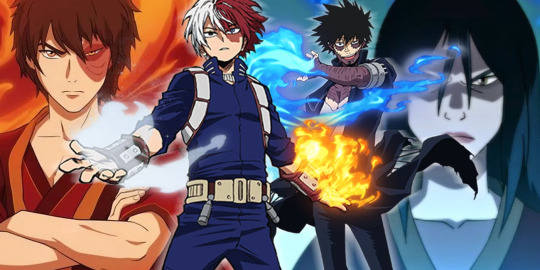
DOOMED SIBLINGS: THE TODOROKIS VS. THE FIRE NATION ROYAL FAMILY
I received an ask in my inbox about how Zuko doesn't owe Azula any forgiveness. Truthfully I wasn't even going to respond because this isn't an avatar blog, but then I watched this video.
Not only do I disagree with the basically everything in this video, but I am going to make the argument that both Zuko' and Azula's arcs are both incomplete with the way the show left the two of them in the final showdown.
In order to make my argument I'm going to compare Azula and Zuko's relationship in avatar to Shoto and Toya's relationship in My Hero Academia and use the latter as a more positive example.
Unnecessary Redemption Arcs
The common fandom opinion I want to argue against is this idea that Azula's ending is a perfect tragedy, and therefore doesn't need to be expanded upon. There's also a sentiment that redeeming Azula would somehow ruin the impact of this perfect tragedy.
I'm about to argue against both of these points.
Azula's arc doesn't work as a tragedy.
Because of this her arc is unsatisfying and unfinished.
I'm going to address the first bullet point but before that let me add another disclaimer. The reason why I think Azula's arc isn't an effectively written tragedy isn't because I like Azula.
Before we even get into the My Hero Academia comparison let me bring up something completely different. I do like Azula, but I like Terra Markov from Teen Titans a lot more and I would not change a thing about her tragic end.
AZULA'S ARC IS NOT A WELL-WRITTEN TRAGEDY
Terra in the comics is what a lot of people accuse Azula of being. She is stated in the text and by her creators to be an unfeeling sociopath. She was also never intended by her creators to be redeemed.
[About Terra] The very first time we see her, she’s trying to blow up the Statue of Liberty. It’s just that all the fans assumed because we went out of our way to make her cute — but not too cute, with the buck teeth and everything — everyone would assume that she was gonna become good by the end and that was never the case. First thing, we made a promise that day that we would never renege on our view that she’d never become good. It’s sometimes hard to do that with characters you like. You want them to become good or something like that. But we never liked the character enough—because we knew what we were doing with her—we never allowed ourselves to fall for the character. Because that’s bad. That’s bad storytelling. You’re doing what you want as a fan at that particular point, not as the creators. T
Now let me clarify, both creators of New Teen Titans say some nasty things about Terra and don't recognize her sexual abuse, but here's the thing. You don't have to read a story 100% the way the author intended, sometimes the story says one thing and the text says something different.
I am going to use Judas Contract as an example of a story where the character from the start was never intended to be redeemed and why that's a positive in this case.
Terra is a teenage girl, the bastard daughter of the king of Markovia and a random American woman who presumably has had no stable home her entire life because she's working as a mercenary at fifteen. She teams up with a man that is in his mid fifties and even starts a sexual relationship with him (this is statutory rape she cannot consent) and Deathstroke uses her to infiltrate the Teen Titans and learn as much as possible.
Terra is sent to live with the team and spy on them for several months. The whole time she only ever engages with them in a fake spunky persona, and never shows her real cutthroat self. She leads Beast Boy on in a fake romance to make him trust her and secure her place on the team. The way you'd usually expect this arc to go is that Terra would grow fond of the team and be torn in her loyalties.
Yeah, that never happens.
Terra loathes the Titans. In fact she's developed a superiority complex about her meta human abilities and she doesn't understand why anyone would use their powers to help others. She despises the concept of superheroes in general, and because of that never bonds with any of the Titans. Her feelings never change from start to finish, because her creators intentionally wrote her as a character that can't be redeemed.
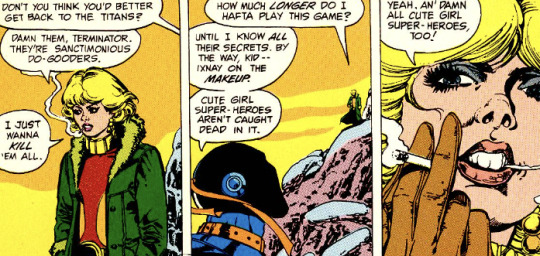
Terra is written to be a psychopath, but even with that intention in mind there are scene that shows a greater range of emotions. She has what could amount to a trauma flashback when Beast Boy too aggressively flirts with her and tries to kiss her and she reacts violently, trying to bury him under the earth.
Let's go ahead and interpret Terra as what is used as the fictional definition of a "sociopath" that is someone who feels no bonds with other people, someone with shallow emotions and someone devoid of guilt. Even if we interpret her that way, her story is still meant to be read as a tragedy.
Terra succeeds in her mission of infiltrating the Titans. Slade captures most of them, and the only remaining member Dick Grayson goes missing. Dick Grayson then unites with Slade's son Jericho, and the two of them team up in order to rescue the rest of their friends.
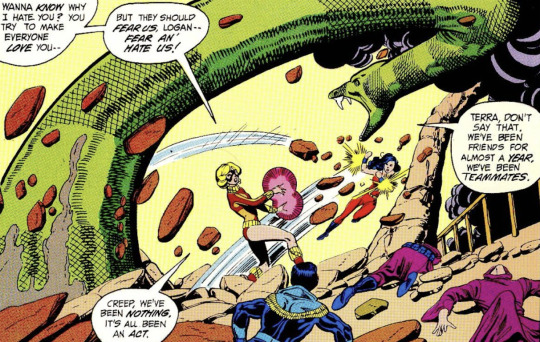
Even after all she's done the Titans try to make pleas to Terra during the final battle, which she not only rejects but responds to with violence. Which only confirms what I said above, Terra never grew to love them, she never regretted her actions, she only ever engaged with them with lies.
(Terra always lies, Terra always lies, Terra always lies).
Terra is declared by Raven to be devoid of emotions: "Her thinking is unlike ours. She feels no true love or hate. Her soul is corrupt. What she does is done without remorse."
Even after Raven declares this, however she still pleads with Terra to stop because she's going to hurt herself. Terra feels Slade betrayed her because he favored his son Jericho over her, so she decides to take both Slade and the Titans down. As the Titans fight her she begins to mentally fall apart ignoring their appeals to her and lashing out at everything around her. Eventually she makes one last attempt to everything around her, but the Titans escape and she only manages to bury herself.
At no point in the fight do the Titans give up on trying to reach her even as she's loudly screaming how much she hates them. Even after she's buried and it looks like she's dead, Gar and Donna both try desperately to dig her up on the slim hope she's still alive. When they find the body they even give her a funeral afterwards, even though they all think that Terra was beyond redemption.
Even the prose narration that accompanies her death is incredibly melancholy and bemoans her fate, at the same time as it calls her a outright sociopath.
There's no reasoning with her now. However slim, whatever sanity Tara Markov possessed is gone. Now there is only primal hatred! Hatred born, nurtured, and fanned. Hatred that festers and grows without care, without feeling, without plan. her pursed lips part and the sounds which echoes force are garbled and inhuman. Hot, boiling blood gushes wildly from the earth's open wounds, its skin fractures and cracks, and if a world could cry, it surely would. Her name is Tara Markov and she is little more than sxiteen years old, and due to the fault of no one but herself she is insane. No one taught her to hate, yet she hates without cause, without reason. No one taught her to destroy, yet she destroys with glee, with relish. Don't look for reasons which do not exist, plainly Tara Markov is what she is, and she has taken a great power and made it as corrupt as she. Hers was the power over the earth itself she could have brought life to deserts, hat to the frozen tundra, food to sraving millions. She could have damned raging rivers, and tunneled water to packed lands dry and dead. her powers were limited only by the mind which controlled them. A mind which sought not hope, not love, not life, but death.
If you go with the text that she is just a sociopath beyond redemption who hates and hates and hates for no reason, the narrative still mourns her because a sixteen year old with her whole life ahead of being consumed by hatred and then dying because of it is in fact sad.
If you read into the subtext then you can argue that the events of the story, contradicts what the narration is telling us. Terra is being sexually groomed and groomed as a child soldier by a man who is much older than her, even if she thinks he's a partner he clearly has all power in the relationship.
If you think about it that way then Terra is the ultimate bad victim. She doesn't cry and call for help as a victim of sexual abuse, instead she tries to claim power for herself, she manipulates, and she destroys any chance she had for a genuine relationship because she only sees all relationships as transactions she can gain or lose from.
Even if you only go with the first interpretation, the narrative still remains tragic because the Titans themselves did not want to give up on her, they did not want to watch this sixteen-year-old girl destroy herself. They never stop reaching out for her and it doesn't work, because there was no way out for Terra but death.
Here's the thing I don't think Terra's status as a sexual victim automatically means an ending where she dies is offensive. It reflects a reality that victims like Terra often go unseen because they don't present their victimhood in palatable ways, and by the time anyone notices it's far too late. Sometimes tragedies are meant to reflect a reality where many people do not get saved.
There's two reasons that Judas Contract works as a tragic story. Number one the creators planned Terra's ending right from the beginning. Which meant they never gave her any moment where she shows that she's redeemable. There's no genuine bond between her and the titans, no wrestling with the guilt of her actions, nothing.
Number two, Judas Contract is Terra's story from beginning to end. It begins with her betrayal of the Titans, and ends with her death. The death is also brought upon herself by her fatal flaw her hatred, which is what makes her the protagonist of a tragedy. Tragedies are stories where heroes are undone by their flaws. Terra also goes out on her own terms. She buries herself underneath her own rocks. Her death is a direct consequence of her inability to let go of her hatred. Terra's not fridged for anybody else's arc, she retains her agency until the exact moment of her death.
To simplify into bullet points, Judas Contract works because:
The creators thought out what they wanted to do with Terra.
Judas contract is Terra's story.
Now, getting to the part where we actually talk about Avatar, and I start complaining about that awful, awful video.
AZULA'S ARC IS NOT WELL THOUGHT OUT
I just went on a long tangent on how Terra, a character written to have no redeemable qualities can still be tragic. How the creators marked her as clearly doomed from the start, and how she brought about her end on herself, how there no redemption for Terra. How this girl had no real chance, and how regardless of the fact Terra is a lil baby sociopath her fall is still tragic because of how well structured the tragedy is surrounding her.
It's awful to kill off a sixteen year old victim of sexual abuse, but the ending just fits because Terra represents a certain type of bad, unsympathetic victim who doesn't get saved.
Azula's arc isn't as well structured. The ending does not fit. I'm going to start by refuting some points in the awful, awful video I did not like.
"Maybe it's okay if Azula's story ends where it does in the series we would separate how we would treat a real 14-year-old girl from a villain in a series, ad that's why any redemption arc isn't need i a story after all. A character needs of deserves a redemption arc when it becomes the most meaningful way to explore their character and place in the story, but a character deserving redemption usually comes before the story really needing it, and I don't think Azula's done anything to deserve it yet. They've got to exhibit some willingness and action to change..."
So the main reason I'm using Terra as my first example is because Terra is the kind of character that Hello Future Me is describing. Terra was written with the specific intention she'd never experience a change of heart, all of the friendships she makes with the Titans are fake, she very loudly experiences no remorse, or even self-reflection over what she is. Terra's pretty proudly a monster and she never experiences any kind of self-doubt or regret over what she's become.
I can disprove right away Hello Future Me's blanket statement (with no actual cited examples, just trust him guys) that Azula never did anything to hint she may deserve redemption. That suggests Azula is an entirely selfish character who uses, manipulates and thinks she's right and worst of all is comfortable being the way she is, and therefore incapable of doing the self-reflection necessary for change.
Azula does show the capacity to do selfless actions several times in the narrative, and even consider the feelings of others. There's the apology scene with Ty Lee and the way she interacts with her friends in general with the Beach where when she's not fighting in a war or trying to complete a mission for her father Azula 1) interacts with her friends in a normal way and 2) seems to express a desire to experience normal relationships not the hierarchical ones she's experienced all of her life.
However, that's not the example I'm going to use as her save the cat moment. I generally intend to interpret that as a sign that even though she treats Mai and Ty Lee as subordinates and that power she holds over them eventually leads to them leaving her, their friendship isn't just Azula abusing them and lording her authority over their heads 24/7.
No, Azula's save the cat moments all revolve around Zuko. Which is funny, because the entire fandom seems to regard Azula as Zuko's evil little sister who exists to do nothing but torment her.
The first and biggest is Azula deciding to bring Zuko home in Ba Sing Se, and telling a lie to her father that he was the one to slay the avatar.
Ozai: I am proud of you, Prince Zuko. I am proud because you and your sister conquered Ba Sing Se. I am proud because when your loyalty was tested by your treacherous uncle, you did the right thing and captured the traitor. And I am proudest of all of your most legendary accomplishment: you slayed the Avatar.
Zuko: [Shocked.] What did you hear? Ozai: Azula told me everything. She said she was amazed and impressed at your power and ferocity at the moment of truth. [Inspired partly by this post]
Now the show seems to regard this action as Azula being an evil temptress who is there to tempt Zuko back to her side with everything he thinks he ever wanted.
That's only if you regard it from Zuko's perspective.
Think for a moment from Azula's perspective. Number one, Azula is someone thoroughly indoctrinated into Fire Nation propaganda who measures her self-worth based on 1) military achievement and 2) her father's approval and assessment of her talents. In Azula's own logic (wrongheaded as it is) she's helping Zuko. She's bringing him back home with his place in the line of succession restored and his father's approval.
Azula doesn't benefit from this gesture at all, in fact if her father discovers the lie she has as much to lose as Zuko does.
Now Zuko insinuates that Azula only brought Zuko along and told her father that he was the one who killed the avatar so she could let him take the fall if the avatar turned out to be alive.
However, if you look at the actual order of events that doesn't make sense. Azula saw the avatar die, she didn't know about the spirit water, and therefore had no way of knowing Aang could come back. In fact, it's Zuko who 1) knew about the spirit water and 2) decides to keep the spirit water and the fact the avatar might have survived a secret that is throwing Azula under the bus. After all she has as much to lose as he did and instead of sharing that information with her he decides to keep it all to himself.
Now Azula does imply that if the avatar were to turn out to be alive all of Zuko's glory would dry up, but this is only after Zuko 1) throws accusations at her and 2) makes it's pretty clear he's lying to her putting her on the defensive.
This is also a scenario where Azula doesn't have much to gain by bringing Zuko back, if you look at it from her perspective. If Azula just lets Zuko rot in a ba sing se prison, then her claim to the throne is secure. With Zuko back he's restored in the line of succession. She also, when making the decision to invite Zuko to her side probably didn't need him for her plan to succeed.
There is a dramatic moment of Zuko choosing to side with Azula over Katara which turns the tide in Azula's favor, but Azula can't see into the future and therefore wouldn't be able to predict that happening. If you look at it from Azula's perspective she 1) successfully infiltrated the city, 2) already had the Dai Lee in her pocket. She likely already thought she had the city secure at this point so her decision to extend a hand out to Zuko is therefore likely motivated by selflessness instead of self-interest.
That's important because usually when Azula usually only gives her help to others if it also benefits her in some way. Azula might genuinely see her recruiting Mai and Ty Lee to her side as a member of the royal family extending her favor and giving them status and security in their positions but it has the underlying motivation of 1) she keeps them in a position to beneath her and therefore in her complete control.
Azula will interact with Mai and Ty Lee like friends on the surface, as long she maintains control over them, but if they do anything to something that displeases her she'll do anything to regain her control.
Mai: I thought you ran off and joined the circus. You said it was your calling. Ty Lee: Well, Azula called harder.
This is set up in Azula's very first interaction with Ty Lee. Azula greets her like an old friends, Ty Lee even seems happy to see her, but the second Ty Lee tries to say no to her Azula goes to extreme lengths to "persuade her". Azula's friendship with Mai and Ty Lee is an abusive friendship because there is a power differential and even if Azula feels genuine affection for them both it's clear they're not allowed to say no. Mai and Ty Lee are put into positions where it's in their best interest to please her, and live in fear of the consequences if they don't do just that.
Here's the thing, I'm not arguing that Azula didn't deserve any consequences for her actions. I'm arguing that the setup doesn't match her eventual ending. Azula is set up to have Mai and Ty Lee leave her from the very first scene that Azula interacts with Ty Lee. It's satisfying because the set up matches the pay off.
It's also tragic because it's Azula continuing the chain of abuse. The video isn't entirely wrong (which is why they came to the wrong conclusion frustrating).
Azula's fall is about how differenting parenting styles can a child. Ozai's affection is exchanged for being useful. Something Azula would go on to repeat with her friends, whereas Iroh's affection is something freely given with patience for imperfections and failures, something Zuko goes then on to repeat.
It's like... there it is it's so close. Here's the thing, Azula is set up for a tragic falling out with Mai and Ty Lee (and one she deserves) but the set up is different with Zuko. Azula's save the cat moment revolves around Zuko, and her genuine attempt to bring her brother home.
Yes, the first time Azula interacts with Zuko in season 2, she tries to take him home by force. However, by the ending of the season Azula's perspective on the matter has obviously changed because she begins by trying to bring him back as a prisoner, and by the end of the season invites him back as an equal.
There's no moment in Season 3 where Azula treats Zuko the way she does Mai and Ty Lee (unless Zuko provokes it first and puts her on the defensive) in fact most of her interactions are either them interacting normally (such as when Azula goes to find Zuko at their old beach house because she knows he'll be there and advises he leave instead of dwelling on their depressing memories) or Azula deliberately trying to look out for Zuko such as when she advises him not to go visiting with Uncle because it'll make others suspicious.
On the other hand, Zuko never at any point looks out for his sister the way Azula is demonstrated looking out for him. He doesn't say, try to tell her where he's going on the Day of Black Sun, or try to convince her the fire nation is wrong. There's a scene in the later part of Season 3 where Zuko is watching Azula fall to her death while sitting on a flying bison and not only sits there and does nothing about it, but sounds disappointed when she doesn't hit the ground and become an Azula Pancake.
That's pretty much the opposite of a save the cat moment. It's a "let the cat fall to their death" kind of moment.
Yes they were enemies at that point, but Zuko's the one who's supposed to learn that affection is something freely given with patience for imperfections and failures, something Zuko goes then on to repeat.
How exactly is he doing that in this scene?
The thing is... this setup doesn't have to be bad. Of course Zuko has trouble has trouble empathizing with Azula, he doesn't even think about sending a letter to Mai, Zuko's shown at this point to be like a healing abuse victim who's understandably focused on himself.
This in fact could be excellent set up with step 1) learning what genuine love and forgiveness is and 2) demonstrating those two things by applying it to others.
However, that's not where we got. We got Zuko watching his sister have a complete emotional breakdown, crying and screaming while chained to a grate and looking somewhat sad.
And once again to bring Terra into this, Terra is what Stay at Home and parts of fandom argue that Azula is. Terra screams at the top of her lungs how much she hates the Titans, how much she was always lying to them, and the Titans STILL try to reach Terra with words, try to de-escalate the conflict, when she's about to bring the rocks falling down on herself warn her she's going to hurt herself, and then when she's buried under rubble try to dig her out begging for her too still be alive.
Terra who's intentionally created by her writers to be as hatable as possible, is shown more compassion by the heroes in her ending than Zuko ever does to Azula. They also give Terra multiple opportunities to change until literally the very last minute, which Zuko doesn't do either.
What's set up is Azula has this save the cat moment with her brother, that Zuko is pretty much the only person she doesn't treat like a subordinate in the story (because she just like Zuko has a craving for familial love she tries to earn from her father). However, her ending with Zuko just taking her down doesn't fit that setup.
Azula's ending only fits if you consider her arc entirely from Zuko's perspective, which is the underlying issue. Azula's not the protagonist of her own tragedy, she's a plot object that's used to benefit Zuko's arc.
Azula's is written to have a downfall, the same way that Zuko loses everything at the ending of season 1 b/c of his inability to give up on the obsessive search for the avatar (and his father's love with it). Azula is written to be left by Mai and Ty Lee (this is the strongest point of writing when it comes to her since it comes from the beginning).
However, she's not written to be left completely alone and insane with the only empathy being shown is that her brother looks kinda sorta sad. That's only good if you view her as an object to further Zuko's arc, because isn't the ultimate culmination of Zuko beating his sister who has always been ahead of him at life? Azula needs to torn down completely without even some small glimpse of a hope of recovery so Zuko can be built up even moreor at least the writers of avatar seem to think so.
However, even Azula just existing for Zuko's growth and character development doesn't have to necessarily be a bad thing. This is where we get to MHA, which does the tragic siblings and the final Ag Ni Kai about 1000 times better with Shoto and Dabi.
THE GOOD
The comparisons between Shoto and Dabi to Zuko and Azula are made pretty often by the fandom. Shoto has a scar, Dabi has blue flames. Shoto has an arc about healing and learning what it means to be a hero, Dabi's arc is about self-destruction.
Dabi's not the center of his own story, he exists to foil Shoto and help Shoto reach the endpoint of his character development however that's not necessarily a bad thing. These are both two pairs of tragic siblings, the main difference is that MHA doesn't feel the need to tear down one sibling in order to build up the other. In fact, the final step to Shoto's arc is HELPING Dabi, not PUTTING HIM DOWN.
Not only that but the decision to help Dabi is a decision that Shoto makes on his own, and him going against the tide of a society that has already given up on Dabi and would much rather have Shoto shoot Dabi like a mad dog. Which makes the decision to do so even more powerful and emblematic of Shoto's growth.
Now you could say that Shoto and Zuko are too different to compare their arcs, Zuko has a redemption arc, and Shoto has what most people would probably term a healing arc. Shoto starts out the series as a hero.
However, this is what annoys me about the redemption arc debate. A redemption arc is really just a normal character arc. However, calling it redemption drags things like morality and forgiveness into the debate. if you take remove the discussion about moral philosophy both Zuko and Shoto have character arcs where they start the story defined entirely by their home situations and their father's abuse (hence why they have big obvious scars on their face), recover from their trauma, and go on to find an identity outside of their father and form healthy non-abusive connections with others.
In fact I'd see the theme of both arcs are the same, to literally find balance within themselves. Shoto is divided quite literally into right and left sides, fire and ice, and even seems to view himself as half of his father and half of his mother. Zuko is someone who's permanently marked and dishonored by the burn scar on his face. He suffers from an internal imbalance as well. Iroh says that Zuko is the descendant of both Roku and Sozin and therefore both pathways are open to him (but wouldn't that apply to Azula too). Zuko says to his father that the fire nation has destroyed the balance to the world and he's going to leave to assist the avatar in order to fix it.
Shoto's balance isn't just about fixing his internal trauma though, it's also about finding a balance between his family which has defined his entire life up until this point, and his desire to become his own hero not the hero his father groomed him into.
It's why the culmination of his arc is Shoto reaching out to save his family member Toya, because it's the ultimate balance in wanting to heal his family, and also the kind of hero he wants to be, someone who saves and brings peace to others instead of just violently putting down villains. He can bring peace to his family and become his own hero in one action.
However, let's go back to the beginning of Shoto's arc, because saving Toya as an endpoint to his arc is set up pretty early on.
Shoto's arc begins with Deku, a stranger breaking down Shoto's walls as an outsider in order to allow him to look past his own trauma and recall for the first time what he wanted outside of his resentment towards his father. This sets up the idea early on for Shoto that sometimes you need outside interference, help you didn't ask for, especially when you can't see outside of your own problems.
What Deku brings about ultimately is a change of perspective, Shoto's so hurt by the memory of his mother throwing boiling water in his face and everything that came after that he can't recall the memory of her telling him he could be who he wanted to be.
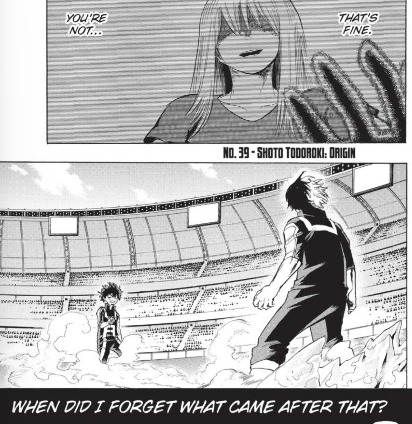
But, you want to be a hero right?
Shoto takes away two things from this arc, sometimes you need help even when you're not asking for it, and sometimes a change in respective is required in order to take the first step forward.
He goes to demonstrate these things multiple times, but here's two exaamples. The first Shoto demonstrates immediately after the tournament arc. When Iida is about to go down a dark path and commit a revenge killing on Stain. When, as a result of that IIDA is paralyzed and about to die in an alleyway, it's Shoto who both notices Midoriya and Iida are missing and shows up in the clutch. He's practicing the same thing that Deku taught him in the last arc: Giving help that's not asked for is what makes a true hero.
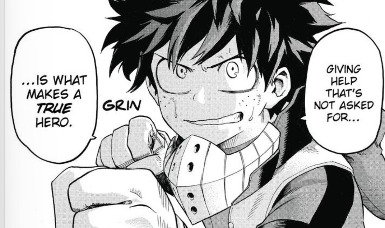
He even mentions the second idea, that a small change in perspective can be all it takes to save someone, and he wants to do for Iida hat Deku did for him. His words are the one who convinces Iida to stand back up again when he's paralyzed.
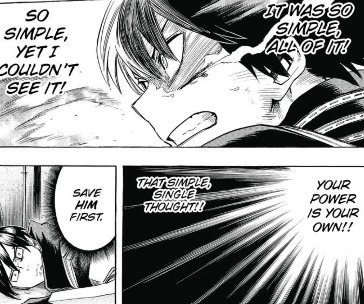
If you wanna stop this, then stand up. Because I've got one thing to say to you. Never forget who you want to become!
However Shoto's arc doesn't end here, because one of the major conflicts in MHA is that heroes don't pick and choose who to save and a true hero will give help even to those people who don't ask for it.
This is a point which further develops when Shoto's abusive father starts to show a change of heart at the end of the Pro Hero Arc. Shoto still holds his father accountable for what he did in the past, but he also acknowledges that if he had the capacity to change then so does Enji. This isn't about whether or not Enji is forgivable, this is an extension of what Shoto learned. Shoto originally believed he was controlled by the circumstances of his birth, that his fate was set in stone, but a change in perspective allows him to realize he can determine who he wants to be. So, Shoto is just applying what he's learned, Enji has the capacity to grow.
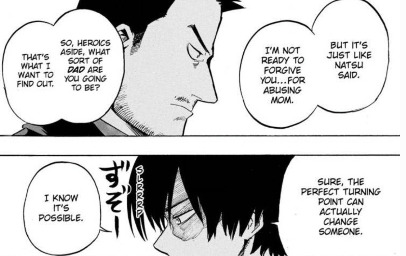
There's one final piece of setup that I want to cover before showing how these separate dies all culminate in saving Dabi. Shoto's not only someone who has to find balance between his family and his desire to be a hero.
The theme of balance is written into the quirk itself. Enji basically practiced eugenics to create Shoto as his masterpiece. He noticed a flaw in his own quirk where he could only make his flames so hot without overheating. So he arranged a quirk marriage with Rei who possessed an ice quirk to create a hybrid ice and fire quirk that he could use to cool himself off to prevent him from overheating.
Enji only ever cared about the fire half of Shoto's quirk. His ice quirk only exists for his flames to grow stronger. This is shown when Enji is trying to force Shoto to learn all of his signature moves, because he only cares about Shoto's flame quirk. Shoto was created to carry on his father's legacy, and surpass him with an even more powerful flame quirk. Part of his character development is him learning how to use his quirk in his own way.
This is a theme that continues in the class training arc where Enji is still repeating the behavior of trying to force Shoto to learn his signature moves instead of considering what he wants at all, because still Shoto only exists in Enji's mind to carry on his legacy.
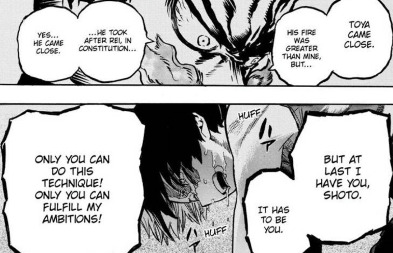
This all culminates in Toya's decision to save his brother. The first is his action in choosing to identify with his brother. If Shoto believes in his own capacity to change, and even his father's, then why would he deny Toya that same chance to change?
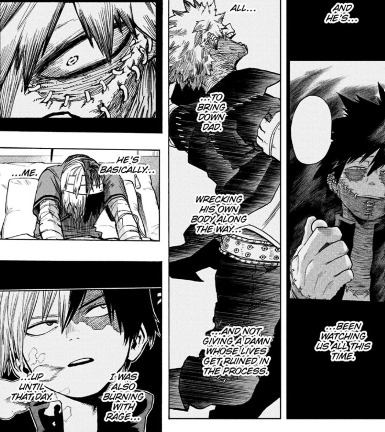
The foiling between Shoto and Toya isn't supposed to reduce the two of them to "Shoto is the good one, and he's the bad one", but instead Shoto and Toya were both in a point where they were consumed by hatred and couldn't see any other path in life. Therefore if Shoto was able to change because someone gave him help when he didn't ask for it, then Toya not only has the capacity to change - but in order for Shoto to stick to his stated beliefs that the smallest of things can bring about a change in people he has to be the one to give his brother that chance to change.
It's not about whether Dabi is worthy or not, it's about the themes in Shoto's arc finally being paid off.
Shoto's identifying with Toya, and even parts where he tells Bakugo he'll make Toya sit down and make Toya tell him his favorite food indicate that from the beginning Shoto's intention was to find a way to stop Toya without killing him (which is what several of the adult heroes were encouraging him to do).
@stillness-in-green does a more succinct summary of this plan.
Just me?
Because, like, Shouto had a plan. He spent the time between the two war arcs specifically developing a brand-new combat technique that he planned to use to shut down Dabi's combat advantage without killing him. He convinced his dad not to change the plan like Endeavor was hesitantly sounding him out about[1]; he went out and talked and asked questions, and even if they weren't the right words every single time, he did his best and he did it with intention. If Dabi proves to be dead, it won't be because of anything Shouto did to him; it'll be because Dabi himself chose to stand back up, take a warp gate across the country, pick a fight with the guy who doesn't have the power set to shut him down without unduly hurting him, and trying to replicate an Ultimate Move specifically tailored for someone with a balanced power set Dabi doesn't have. And if Dabi lives, it's still going to be because Shouto booked it across the country and used that same technique to stop him again.
Shoto's decision to save Shoto is also a continuation of his decision to help save Iida from Stain. It's not enough for Shoto to experience a change of heart about his own life, he's got to take what he learned about people's capacity to change, and the importance of connections and then put that into practice and help others the way he was helped.
However, it also further develops the theme of giving help that's not ask for from Iida because Shoto's not saving a mostly heroic kid, he's saving Toya to help break a familial cycle of abuse (because murdering the abuse victim isn't how you end the cycle of abuse... actually).
Shoto's last lines to Dabi are also a refutation of this idea of destiny that he once thought he was ruled by. It's once again, Shoto teaching someone else the lesson he learned. Toya says a warped rail can never mingle with a straight and narrow one! In other words Shoto can never understand or get along with Dabi, because Dabi will forever be defined as the failure because of the circumstances of his brith, whereas Shoto will always be the success.
His final action is a decision to break the cycle they were born into: no, we're gonna mingle whether you like it or not.
Shoto's ultimate move Phosphor is not only a move he designed far in advance to take down Dabi non-lethally, it also is a rejection of his father's teaching method. Toya says he only ever taught me how to turn up the heat. Enji only valued both Shoto and Toya for their flame quirks. Developing his own quirk and breaking away from what his father wanted, specifically in order to save his brother. It's Shoto rejecting what his father created both of them for (a successor to his quirk) and finding his own path. By using that move to take down Dabi he's not only teaching Dabi their flame exists for more than just destruction, he's also by letting Dabi live giving Dabi a chance.
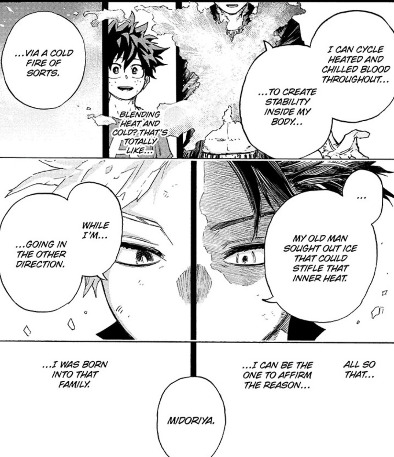
From a conversation with @class1akids
Dabi was the last push to unlock Shoto’s full power. Until then he was on the track of mastering flashfire like Endeavor planned for him (except for his own reasons) but realising the fighting Dabi with fire was gonna kill them both and also he’s simply no match fire only helped Shoto to fully take control of what his quirk is Like his quirk development goes parallel with how he faces each member of his family and finally meeting Toya is like the last piece of his puzzle to find his own full power and identity.
It's not just Shoto decides to save his brother because he's just that nice, his arc is literally incomplete without it. The act of creating phosphor a move specifically to save Dabi is both him unlocking the full power of his quirk (by balancing the fire and ice sides of his quirk) but also achieving balance between trying not to leave his family behind while at the same time becoming his own person and hero outside of his family circumstances.
Citing my conversation with class1akids again:
Toya is endangering everyone at Gunga. Endeavor has no means to stop him and when he tries to murder suicide Rei interrupts and his “hero way out” is taken. All he can do is watch helplessly as his family is about to burn to death with a bunch of strangers he tried to protect. But it would do Shoto dirty to use his heart technique to kill his family and the strangers so he comes in a clutch and I see that confrontation as the power trauma vs the power of healing in the family. With Shoto who is a true hero, they can put the fire out and save the family and strangertoo. Shoto become a balanced hero and bring relief and reassurance, Endeavor was completely helpless, and Toyas inner child got the attention he wanted, plus depending on how you read it, he may have become less suicidal.
Shoto also, and I want to point this out desires to stop his brother not to take him down but because he doesn't want him to hurt any more people. He's again finding a balance between two ideas 1) Shoto needs to stop his brother in order to stop him from creating more victims and 2) Shoto needs to find a way to stop him that's not just putting him down because Toya himself is a victim.
Shoto also, and I must point this out for the comparison between Zuko and Azula goes out of his way to engage Dabi in conversation, ask him why he didn't come home and what happened to him in the years after he died. This is especially poignant because unlike Zuko and Azula who grew up together, Shoto basically had no relationship with his brother (and the rest of his siblings really) before Toya died because Enji purposefully kept Shoto separate from all the "failures."
So yes, the act of saving Toya is more for the completion of Shoto's arc than any redemption arc for Toya but Toya's not just a plot object to move around for Shoto's arc, Toya has his own agency all throughout. In fact it's the fact that Toya resists being saved every step of the way that provides the challenge that Shoto needs to grow in order to be able to save him.
Toya's not just after revenge against his father that's the surface reason, Toya is also just blatantly suicidal. Toya's birth is marked as a failure, his death wasn't even acknowledged by his family and everything stayed the same in his absence, so he created Dabi while praying at his own shrine in order to mourn Toya. Dabi can't find any meaning in his life where he was born as a failure, so he'll use his death taking revenge against Endeavor for having been born in order to give his life meaning.
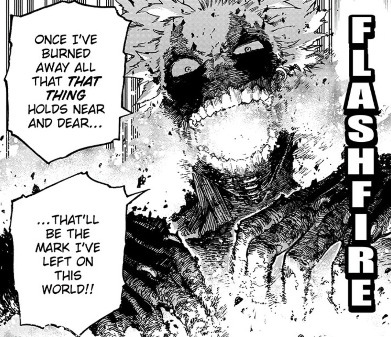
What makes Avatar look especially bad in its treatment of Azula in comparison to how MHA treats Dabi, is that Dabi is way, way less redeemable than Azula. For one Azula has clearly proven affection both her friends and her brother (and I don't think she even deserves Mai and Ty Lee's forgiveness they had every right to walk out on her and want nothing to do with her again.)
Dabi is probably the ugliest victim of the League of Villains. The rest of the league have far more moments in their bonds with each other. Toya is the outsider to the league even if there are some subtle hints to his affection (he tries to show up to save Twice, and also burns down Toga's family house to comfort her). The villains are mostly shown to be redeemable by their positive friendship with each other, and Dabi at several points denies the league's bond (he pulls a Terra and yells out loud at the top of his lungs none of the league matter to him). Unlike with Terra you can argue this is most likely Dabi trying to cover up his real feelings. However, the fact that he feels the need to hide his affection from the league shows he's purposefully distancing himself from any bonds whatsoever.
Unlike Azula who has gone out of her way to help her brother in one major way, and also shows hints in early season 3 of having that sibling bond with him Dabi just straight up wants to murk Toya. Azula also tries to murk Zuko, but that's only when Zuko leaves on the day of Black Sun (one without telling her, and two something that probably left her alone to deal with the consequences of lying to her father for his sake). Either way, Azula's behavior in early season 3 is setup for the fact that their sibling bond can be salvaged.
Dabi is way worse to Shoto in comparison. Dabi in the first part never saw Shoto as his own person, just a puppet of his father (puppets have no autonomy or personhood). His feelings towards Shoto only went so far as Shoto was someone who could kill in order to upset Enji. Dabi also doesn't particularly care for the rest of his family as well (only calling out Natsu's name when his brain is literally melting), they're either ways to hurt endeavor, or he wants to drag them in hell with him. Heck his last words after being saved is telling everyone to die and go to hell.
Dabi doesn't bother to make bonds with the league or have any lingering affection for his family because Dabi's determined to seslf destruct. He's given up on life the moment he saw that he died and nothing changed in that household, now all that's left is for him to create a meaningful death by dragging his family to hell with him.
Dabi is also even as a child made out to be an unpleasant victim. He attacks baby Shoto with his flames early on out of jealousy (even though he later admits that he was being unfair to Shoto). He makes the situation in the house worse by loudly screaming and demanding his father's attention. He screams at his mother and throws her complicity in Enji's abuse in her face.
This is in comparison to Shoto who in childhood flashbacks we are only ever seen either 1) crying, and 2) trying to comfort and protect his mother. Toya's even made out to be difficult to empathize with as a child - which like flew over half of the fandom's heads because he got accusations of somehow abusing his father and the rest of his family in that chapter at 10 years old. However, that in a way illustrates my point.
The fact that Dabi is so disliked by a certain portion of the fandom is because Horikoshi paints such an ugly portrait of Toya in the way he expresses his victimhood. It's done deliberately too, because number one Toya by resisting Shoto's attempts to save him and trying to self destruct instead retains agency as a character. He makes decisions even though they're bad self destructive ones, he's not just a prop. Number two, the fact that Toya is intentionally portrayed as such an ugly victim makes Shoto's decision to break the cycle of familial abuse by saving Toya and not leaving a single family member all the more poignant.
Toya is an uglier victim than Azula, actively trying to kill himself in a way that Azula isn't, and treats Shoto way worse than Azula ever treated Zuko and yet Azula isn't shown the sympathy or given the salvation that Toya is.
Because once again, the writers didn't think about the ending of Azula's arc or of Azula as her own character. Shoto defeating Toya is the culmination of his desire to break the cycle of abuse in his family. Zuko putting Azula down is just to make Zuko look better. It's in service of Zuko's character instead of both of their characters.
THE BAD
Avatar isn't setting up some gritty ending where the bad guys can't be stopped, they can only be killed. In fact it's pretty close in tone to MHA.
Season 3 especially is the season that really begins to hammer in on the themes that even the people on the enemy side are still human after all. The headband shows that Fire Nation children are indoctrinated into the war, but they are in the end still children. There's the story between Avatar Roku and Sozin, and once again Iroh saying that Zuko has both options becoming like Roku or becoming like Sozin available to him (but not Azula I guess). There's Zuko joining Team Avatar, even after he betrayed Katara in Ba Sing Se and should have burnt that bridge then and there. There's Zuko working to earn their trust again when no one on the team really owe it to him.
The main character of the show is a pacifist, who deliberately learns a way to stop Ozai without killing him before the final battle because he doesn't want to break the values taught to him by his culture.
If the entire theme of season 3 is redemption, healing and that the fire nation are not inherently evil then why does Zuko's sister and character foil end the last shot of the series screaming and crying with no one comforting or even attempting to sympathize with her. Why is this one character marked for tragedy in a show that is about redemption and healing and showing compassion to your enemies and very specifically not a tragedy.
Toya literally burns all of the flesh off of his body, and somehow he has a gentler ending than Azula, because at least Toya's arc ends with all the members of his family showing up to try to cool down his flames, and when he's on the ground burnt to a crisp his father finally apologizes to him. Toya is a skinless burnt chicken wing, my boy has no skin, and somehow he's better off than Azula.
I don't think the writers gave Azula such a cruel ending because they don't like her, but rather because they just didn't think about her ending outside of what it meant for Zuko. Which is why you get moments like Aang who is apparently a pacifist who doesn't want to kill the Firelord, watching his daughter fall to her death while sitting on a flying bison and doing absolutely nothing to save her. ALL LIFE IS PRECIOUS (except for Azula I guess).
It's not bad because a victim doesn't get saved, it's bad because it doesn't fit in with the rest of the story.
Not only is Zuko saving Azula a very natural conclusion to his arc, but there's far more setup for Zuko reaching out to his sister and saving her than there ever was for Toya and Shoto. Both Toya and Terra are screaming at the top of their lungs "I HATE EVERYONE, YOU SHOULD ALL JUST GO TO HELL." They're both making decisions and committing to their self destruction while Azula is a 14 year old girl having a mental breakdown.
Anyway, time to quote the bad bad video again.
"When does a villain deserve a redemption arc? When do we deserve a redemption arc? I know this is gonna hurt, but characters are not people. They are tools. They are represetations of people. They can be used to say other things. They can be symbolic representation of other ideas. Azula's story is not just about a fourteen year old defeated by her brother for the throne, Azula is Zuko's character foil, where she is ruthless and practical, Zuko is empathetic and emotional. Where Azula's a prodigy, Zuko has to work hard to earn eve a fraction of her power.
I specifically chose to cite MHA, because of how differently it decided to use Shoto and Toya's character foiling. Shoto recognizes himself in Toya, and how different their paths were in life. This is explicitly motivates him to save Toya. It's also the culmination of everything that Shoto has learned because Shoto is a hero who believes that actions speak louder than words. It's not enough for Shoto to resolve his own inner struggle, he also has to help Dabi with his because that's showing Shoto has grown rather than telling us.
I think that is where the major difference lies between Shoto and Zuko, we're told that Zuko has chosen the path of empathy and healing, that he's learned to give people love and patience like Iroh has but instead of showing that the culmination of his arc is having a fist fight with his sister in a denny's parkinglot.
Azula is Zuko's character foil, where she is ruthless and practical, Zuko is empathetic and emotional. Where Azula's a prodigy, Zuko has to work hard to earn eve a fraction of her power.
If Zuko is empathic and emotional and that is why he's gained friends while Azula is now alone after having lost her friends due to the way she treated them, then like... what a great opportunity for Zuko to SHOW that quality of empathy.
However, Zuko doesn't do anything that Shoto does in the final fight. He's not even here for Azula, Azula's just an obstacle for taking back the crown. He doesn't talk to Azula, engage her in any way, try to de-escalate and avoid the fight.
If you want to make the tragedy that Azula and Zuko have taken such different paths in life that that Zuko fighting with his sister is unavoidable you could um... at least show Zuko being sad over the prospect of fighting his sister or being reluctant in any way.
(Before you come in here with "Zuko doesn't owe Azula anything take" this isn't about whether or not Azula is a terrible sister to Zuko, this is about the story that avatar is attempting to tell. Shoto and Dabi's fight is tragic because Shoto doesn't want to fight Dabi, he wants Dabi to come home and for their family to be complete. Zuko never expresses anything like that so where does the tragedy come from?)
If it were 100% committed to a tragedy like Terra's death then I wouldn't mind. if it were 100% committed to a story of redemption like Shoto reaching out to Toya then I wouldn't mind. My issue arises from the fact they want to have their cake and eat it too.
They want to give this tragic end to Azula, and use it to illustrate how Zuko has grown as a character. However, you can't have both.
If Zuko's growth is about learning that his father's love based on achievement and 2) learning he needed to get lost in life in order to find himself then why doesn't any of Zuko's actions demonstrate this lesson Zuko has learned about love, and about how you can be your own person outside what your father expects from you.
If Zuko has grown as a character he should be able to show those actions. He does show his new understanding of love and friendship to Team Avatar, but as I said that's easy mode. That's Shoto's attempts to save Iida, it's a step in the right direction. It's also not really Zuko demonstrating a selfless love, because he's also at the same time trying to earn their trust and earn his way into the group.
It's also not Zuko breaking the cycle of abuse in their family in any way. Shoto is trying to break free from his role of his father's masterpiece, and at the same time helping Dabi break free from his view that he's the failure.
It's also such a natural ending for Zuko's arc, to take the lessons he learned from Iroh and give them to his sister who needs them so they can both break away from their father's parenting. As I said Zuko does solve the internal conflict within himself, but he doesn't really demonstrate that by helping someone else find their balance.
If you wanted the tragic end, then it would have to be about Zuko's failure to reach out to his sister, because he hasn't learned how to reach out to her. Or because he tries and is unable to. The writers don't seem to understand that though, they think the tragedy is about Azula bringing it all on herself, and not the inherent tragedy of a fourteen year old girl being unable to be saved.
The set up is right there too, because number one avatar is about balance. So, wouldn't the true ending be finding balance between the siblings, not having Zuko rise and Azula fall. Number two, Azula being alone and friendless because of her own actions is again a parallel to where Zuko was in early season 2 at his lowest point. Except Zuko can be the better person in this situation by reaching out to her.
Zuko doesn't break the golden child / scapegoat dynamic, he just flips it so now he's the success and Azula is the failure.
While Azula's fall comes from cruelty and rejection from friends and allies it is Zuko's humility and kindness and friendship that ultimately wins the day. Him sacrifcing herself for Katara and her bringing Azula down and then her healing him. Azula ending up imprisoned isn't something happening to a real person, it's a deliberative narrative choice by the author to say something about how people like this isolate themselves and end up alone. "
As I've stated above, I'm not saying Azula didn't deserve to take a fall. Her fall is actually set up from the first moment she met Ty lee. However, there's no set up for her fall being permanent.
Azula's given way more humanizing moments than characters like Terra or even Dabi. Which is why Azula being in an insane asylum for the rest of her life doesn't fit as an ending at all.
Azula is one link in the chain of abuse. Her father only gives out affection in regards to her usefulness. No matter what Azula is an asset first and a daughter second. Azula then repeats the cycle and treats her friends the same way. She has been shown through an improper model of parenting of using fear to dominate others with power and control and she replicates that in her other relationships.
Therefore, Ty lee and Mai leaving her is not only deserved, it's the perfect opportunity to pull the rug underneath Azula and to show her that her understanding of how relationships work is completely wrong.
This also mirrors Zuko's arc, because part of Zuko's arc is realizing just how wrong Ozai is for making both children earn his love, and that he doesn't need to measure his self-worth based upon his father's approval. He also learns about healthy expressions of trust and friendship from the gang.
Azula loses in part due to her own inability to form healthy relationships is losing people rapid fire, her brother leaves and joins the enemy side, Mai and Ty Lee betray her in favor of her brother, then her father in one action of leaving Azula behind and throws the title of Firelord to her after it's become completely meaningless reminds her of her place. Azula learns in about five episodes what Zuko had in 3.5 seasons to process that her father's love was always conditional and no matter what she did she would never truly "earn it."
People leaving Azula isn't exactly the problem, the problem is that Azula ends up alone permanently without being given the same chance that Zuko is. Terra, and Toya both get opportunities to turn back. They both refuse the hand that's reaching out to him. Mai and Ty Lee leaving is caused by Azula's own choices, but her ultimate end isn't. She's not even given the chance to turn away being saved like Terra and Toya do because Zuko doesn't even bother to try saving her. Her ending is not entirely brought about by her own choices, because the writers need her to take a fall to uplift Zuko.
Azula ending up imprisoned isn't something happening to a real person, it's a deliberative narrative choice by the author to say something about how people like this isolate themselves and end up alone.
I think once again it comes from the author's misunderstanding things because they don't want to look at the story from Azula's perspective, only Zuko's.
Stay at Home almost had it when he said the tragedy of Zuko and Azula was there to show how two different parenting styles affected these children.
The tragedy is that Zuko and Azula started in the same place, but Zuko had persistent guidance and someone who modeled for him a healthy kind of love. The difference is that Azula has never experienced any kind of healthy love or support on the level Zuko has, so she models all her relationships on the way her father treats her. It's not that Azula is offered some chance for change and rejects it, it's that Azula isn't even aware of the fact that there's another way because no one is there to show it to her.
Which is why I said once again, Zuko being the first one to show Azula the lessons he himself was shown by Iroh is such a natural place for his character to end.
Azula also even while completely alone and with no idea what healthy love is, knows that there is something wrong with her and is troubled by that fact in a way Dabi and Terra aren't.
Azula: I can sit here and complain about how our mom liked Zuko more than me. But I don't really care. My own mother... thoguht I was a monster... She was right of course, but it still hurt.
Then there's the famous mirror scene:
Ursa: I didn't want to miss my own daughter's coronation. Azula:Don't pretend to act proud. I know what you really think of me. You think I'm a monster. Ursa: think you're confused. All your life you used fear to control people, like your friends Mai and Ty Lee. Azula: Well what choice do I have?! Trust is for fools. Fear is the only reliable way. Even you fear me. Ursa: No. I love you, Azula. I do.
Both of these scenes indicate that Azula thinks of herself as a monster and is deeply uncomfortable with the idea. Considering Ursa is a voice in Azula's head and not a ghost, it also shows on some level Azula knew what she did to Mai and Ty Lee was wrong and feels conflicted over it.
Once again she's much more in conflict with herself than Toya and Terror ever are, and who's someone who's constantly warring with himself? Who's someone who could help resolve her inner conflict... Zuko (too bad the way the show's written he never does).
Azula doesn't choose to self-destruct the way that Terra and Toya did. Azula's ending isn't brought about by her choice not to change, because she's never given the chance to change in the first place. Her tragic ending would make sense if it was entirely of her own choices, but Azula doesn't retain her agency in the end it's literally taken away from her. She loses control of her mind, and her ending is being chained to a grate screaming and then thrown into an asylum.
I'm not arguing against Azula's ending because she's my favorite character and I don't want bad things to happen to her. It's because her tragedy isn't about her it's about Zuko, and her ending actively takes agency away from her where at least Toya and Terra both retain their agency up until the end. It's not good writing because the tragedy doesn't fit in with the rest of the story which is about balance and healing - and it's also ableist as hell.
THE UGLY
Azula's ending is unfitting to the tone of the story she's in, makes her and Zuko's arcs feel incomplete, and also is ableist as hell.
Here's yet more evidence that Azula's tragic ending is poorly thought out. Azula's mental breakdown doesn't exist in service of her character, but Zuko's.
Azula's issues pop up out of nowhere after episode 15, and take place over the last 6 episode of the series. The idea of Azula having a mental breakdown isn't necessarily a bad concept, but it's executed poorly.
The first way it's executed poorly is just how rushed it is. There's basically no hints of any mental instability beforehand. Of course people can have mental breakdowns spontaenously like that in real life, but this is a story and stories require foreshadowing. Azula spontaneously developing mental issues doesn't feel like it's planned as a part of an arc. First off, because the writers don't seem too sure about what Azula's symptoms even are. Hallucination, paranoia, manic laughter, but apparently she's still able to bend lightning just fine. Secondly, the writer's intentions for giving Azula a mental breakdown are pretty transparent.
The writer's room needed to come up with a believable reason why Zuko would suddenly be able to fight on equal terms with Azula, so boom sudden mental illness. The intent was not to create a sympathetic portrayal of a young girl struggling with both paranoia and delusions. The intent was to nerf Azula because they couldn't think of any other way this plot could end, other than Zuko and Azula fighting in a denny's parkinglot.
As I said they use mental illness as a plot device to take Azula's agency and choices away from her. It's not done with the intention of humanizing her, and in fact except for one small scene with her talking to her mother in the mirror it's a pretty negative and unsympathetic portrayal of mental illness. Not because the writers hate mentally ill people, but because they needed Azula to have a mental breakdown in order for a plot point to happen. Which is why they didn't think of the potential implciations of such a writing choice at all.
Now, people are going to argue about me so I'll use one final example. Azula's ending may be controversial but it's universally agreed upon that the Game of Thrones Ending was bad, right?
Game of Thrones uses mental illness as the exact same plot device, to explain why Daenerys Targaryen turns from a hero to villain in the last few episodes with absolutely no foreshadowing. In fact, the all of the show director's interviews about that choice are just blatantly ableist.
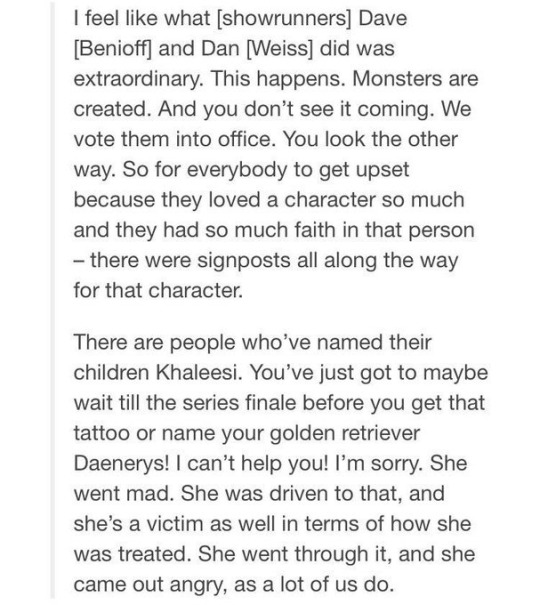
Rant from @hamliet
This quote is (likely unintentionally) gaslighting, ableist, terrible logically, and downright offensive.
First, ableism: why, why, why are we conflating madness with evil? She was driven to madness so she killed a bunch of people and had to be put down? And you think this is a great message in the year of our Lord 2019? [...] Additionally, while good writing is to an extent subjective, there are general consensuses on what make good writing--and Game of Thrones hit all the general consensuses for bad writing, from bad pacing to confusing character assassination. Critics are like, pretty united on this front. No one thought Dany’s turn made sense, even the ones who expect Mad Queen in the books. Maybe if people love a character who is meant to be evil you're not writing them correctly... or maybe they aren't meant to be evil.
Daenerys and Azula are incredibly similiar characters. They're both dragon themed, alligned with the element of fire, they're both colonizers they both represent the warrior princess archetype.
I'd say Daenerys is more of a tragic heroine though, because while Danerys is essentially doing the same thing as Azula, waging war in a foreign land and a culture that's not hers, for the purpose of then bringing back soldiers to her home continent so she can wage war again - while she is definitely a war mongerer she has good intentions. Daenerys for all of her faults, genuinely wants to break the chains and help out people.
I think Azula definitely sees herself as the hero for winning the war for the fire nation's sake, but she's completely uncritical of her own culture and she doesn't really have the good intentions that Dany has. She does it more out of a sense of duty, and her belief of divine right, not because she wants to break people free.
Daenerys's problem is that she doesn't understand the culture she's invading and the complicated world she lives in and despite all good intentions, is as I described above, invading a foreign power so she can go back and wage a war to reclaim the throne. Even if Daenerys would then proceed to go on to be the bestest queen ever that wouldn't change the fact her methods to get to the throne were incredibly violent, and she's sort of failing to break free from the cycle that led the Targeryen rule to fail in the first place.
Azula's problem is she sees herself as the hero and is therefore uncritical of fire nation values. She doesn't have any nobler intentions either other than service to her country, she just like Zuko is just trying to fulfill her duties as daughter and believe her birthright puts her above others. (I mean Dany does too but digressing).
Azula's more of a tragic villain who plays the antagonist role in the story, Danerys is one of the three heroes. However, she's more of a tragic villain in the sense that she's first season zuko pre character development just way more competent.
However, while Daenerys is a much more heroic character than Azula, here's the thing. I still think she's going to die. She is foreshadowed pretty heavily to die, and fail for her quest for the throne, because her entire story is a deconstruction of the warrior princess and the liberator archetype.
However, the story that GRRM is building throughout his books with Dany as an incredibly flawed heroine is different from what we got in the show, which was Daenerys going crazy and starting to murder people. That's because Daenerys turn to darkness wasn't about her character at all, it was just making her into a plot device to move their bad idea for a plot forward. That's why the turn is so unnatural and makes little sense with her character, that's why it's so rushed.
That's also why it's ableist, because it's using mental illness as a plot device to make a character unsympathetic and monstrous and give the other characters a reason to put them down.
The same for Azula, outside of one scene where he's talking to her mother, Azula's mental illness manifests in her screaming, maniacally laughing, looking like the joker did her makeup, and her instability also makes her violent and dangerous to be around. (Ignoring the fact that most people who experience delusions in real life are harmless, and more likely to be the victims of violence).
Her sudden mental illness isn't even used to make her more sympathetic in say Zuko's eyes and make him realize she's a victim, no it's just there to nerf her so she can be violently put down. The way she's drawn, the way she acts, it's to paint her as monstrous as possible. Her last action is like sobbing and screaming while being drawn as ugly as possible. She's not even given a small hope for recovery, because it just ends there. That's a pretty great message to send people that experience delusions, not only will you not recover or be shown sympathy, you'll also get sent to a mental asylum for the rest of your life. The choice for both Azula and Dany is not to portray any kind of mental illness in a respectful way, but to make a plot point happen.
As I said I expect Dany to die in the books, but there's a difference between dying as a tragic hero succumbing to your flaws but still having your good intentions acknowledged and just turning into a villain for no reason and being put down like a rabid dog.
(This is a quote I stole from a Shigaraki post but): "Why does she need to be put down in the first place, she has trauma, not rabies."
The problem isn't bad thing happened to my favorite character, the problem with the ending is it doesn't take Dany's setup into consideration.
Stealing from @hamliet again:
The thing about tragedies is that you have to manage expectations and clearly show that your tragic hero is doomed from the very early on–ie you have to show them making steadily worse and worse decisions (see: Eren Jaeger in SnK), if not directly tell your audience at the very beginning that this is a tragic story (ie see Greek choruses and Shakespeare, the prequels from Star Wars because everyone knows Anakin is Vader–plus I’d argue Anakin’s arc only works because we know he comes back to the light in the end. Audiences don’t like reversing on set up/undoing structure. To make Dany a tragic villain is to go against the structure of her arc in both show and book. That’s why people don’t like it, even if the books makes it seem more believable.
Kate then goes onto describe a character that's much more comparable to Azula's. Honestly Arianne is closer to Azula than Daenerys is.
You know who is set up as a tragic heroine destined to descend and die because of her flaws in the books, whose arc has almost certainly been combined with Dany’s in some sense in the show? Arianne Martell. (and another character known as f!Aegon) In the books, Arianne is incredibly ambitious, and especially resents her brother and his quest for power. Like Margaery (another tragic character), Arianne seeks power and is intelligent and manipulative in her quest for it. But Margaery’s fatal mistake is that in seeking power and prestige, she’s become more a pawn than anything else for a villain (Cersei). She chose to play with lions, and she’ll be torn apart; that’s not surprising. Arianne, as her chapters hint, is going to almost certainly marry f!Aegon, playing with fire, and die burning for it. Arianne’s grasping for her own power is never portrayed as cruel or stupid like the main human villain (Cersei); on the contrary, we empathize with a girl who truly cares about her people, but resents her father’s preferential treatment towards her brother. That’s the difference between Arianne and Cersei: Arianne cares. She is not cruel. But her pride is still going to get her killed.
There's a lot of game of throne females you could compare Azula to because GOT is full of queens, but like. Azula may be a tragic villain firmly on the side of the antagonists but she's not Cerseie. She's not queen, she doesn't wield the power that Cersei wields. In fact one of Azula's downfalls is finding out she doesn't have as much power as she thought she had, and ultimately was just a tool of her fathers.
She's not Rhaenyra or Alicent, because yes she may be grabbing for power but her character isn't affected by misogyny. Because once again, the writers simply didn't think about misogyny except for a really surface level "girls can be just as strong as boys" way so we really have no idea how women are seen in the fire nation. The show doesn't really explore if being a woman makes things harder, or makes people treat her differently than Zuko because the writers just didn't consider Azula's perspcetive on that matter.
Azula is alike to Danaerys in several ways, but as I said I think her ultimate end comes from Azula understimating her own importance in her father's eyes, and quickly realizing when her father is her only family left she never had his love or loyalty in the first place.
But Margaery’s fatal mistake is that in seeking power and prestige, she’s become more a pawn than anything else for a villain (Cersei). She chose to play with lions, and she’ll be torn apart; that’s not surprising.
Azula's most famous quote is about how Long Feng isn't even a player, only to find out her father considered her a pawn from the beginning and be broken by the revelation.
The difference being of course that Avatar is not Game of Thrones and it won't even kill the evil fascist dictator so it doesn't make a lot of sense to hand Azula the ending that Arianne got. They have the same fatal flaw.
Anyway, I made this big post but I can explain why Azula's tragic ending down't work in one sentence.
AVATAR THE LAST AIRBENDER IS NOT A TRAGEDY.
Maybe the reason Azula should get redeemed is because THE SHOW IS ABOUT F&%CKING REDEMPTION.
#bnha meta#mha meta#atla meta#azula meta#azula#princess azula#dabi#toya todoroki#shoto todoroki#azula redemption
369 notes
·
View notes
Text
Ooh! Okay, I love all of that! Thank you for sharing lol you just gave me some epiphanies!
I hadn't quite been able to figure out the significance of Crosshair killing Nolan, like that action specifically, and I think what you said makes a lot of sense! Because it totally wouldn't have worked (narratively or like for the character) if he had just quietly defected after the fact.
Crosshair is really complicated, and since I was focusing more on the comparisons to Emerie I didn't get into all the aspects of his full arc (but at this point why not make the post even longer lolll). But I also noticed how often Crosshair identifies himself as a soldier, I actually originally had this exchange in my analysis:
Rampart: All that time, left for dead and yet you still came back. Why? Crosshair: I’m a soldier of the Empire. Rampart: I see. Your loyalty and determination are commendable.
(which side note, I realize that further shows the difference between those two! Crosshair is there to be a soldier whereas Rampart is just there for himself, like he can't even fathom Crosshair's loyalty after being abandoned like that)
Those recurring ideas of loyalty and purpose are directly tied to Crosshair's identity as a soldier, like that is where he finds his purpose and that's why this is what changes his mind:
Nolan: He served his purpose as a soldier of the Empire.
So the idea that killing Nolan isn't a desperate act of vengeance but Crosshair deliberately giving up his identity as a soldier just really clicks for me and makes that arc feel more complete in a way.
If it was purely self-preservation he could have just defected and run away. That would have been just cutting his losses and leaving the Empire solely because it no longer serves him. But unlike with Cody it's not enough for him to just stop serving the Empire. Instead by killing Nolan he actively rejects the Empire and "seals it in blood" by choosing treason and its consequences. It's like in that act he is 'killing' the soldier that he was for the Empire. (And if we bring the context of Mayday into it, it means that he would rather die defying the Empire than die for them.)
This also ties to my other favorite bit of the vulture symbolism! Which is this moment:
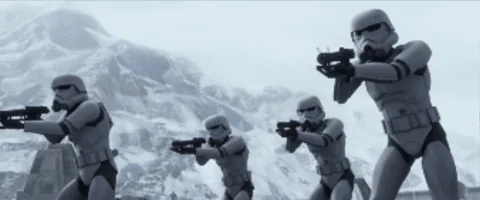
When Crosshair collapses and the stormtroopers close in to take him away, what would appear as his lowest point, the vulture soars upward. To me it shows that even in this dire moment Crosshair truly is finally free. It ensures that this is an internal triumph even if it looks like an external defeat. (And after this turning point he never does go back, even when he could have saved himself by giving Hemlock what he wanted in Tantiss)
So yeah thanks, I didn't quite realize that in killing Nolan he was choosing to be imprisoned or killed as traitor. I think that's a death 'redemption' I could get behind! Because it's not a sudden single sacrifice that supposedly absolves them of all wrongs without ever facing the repercussions (look at that you drew the rant for another time out of me lol), it's him 'killing' the version of himself that did those wrongs, rejecting that identity. It's not 'redeemed' through heroic death, it's like by the death itself (if that makes sense). And since he didn't actually die like he thought he would, he still has to live with the aftermath and implications of that change. Viewing it like that, it makes way more sense that the after-arc in S3 is about rebuilding his identity and finding new purpose with his family: "Omega needs all of us". (which also fits with the hand tremors thing (losing his identifying skill), and more possible parallels with the CX troopers since their "identities were erased" (though that plotline was pretty rushed so I don't even know) but I really like what you said about Ventress and Omega helping him realize things!)
But! He's still only facing the aftermath implications for himself, not for those he hurt with his actions, which is why to me his arc still isn't a 'redemption' in that sense. And @laughhardrunfastbekindsblog (sorry I don't want to keep reblogging my own beast of post lol) yeah it is 100% a valid arc/ change, I guess it depends on your definition of redemption, because to me the amends/accountability part is really important (something this posts (@antianakin) touches on, though I clearly disagree with the purpose of those characters' arcs). And to clarify, I'm not talking about the character himself, or what he's been through or deserves or whatever, it's about how it's written and what the story we are actually given is saying. That's what I'm critiquing.
With the above context I see how the change itself is really vital. I can get what you're saying that it "convinced Howzer that Crosshair had changed for the better, and that was good enough for him." And it is in-character honestly (Crosshair's not much for words) and it works for what it is.
What bothers me with those episodes (I guess we can do this rant now too lol might as well) is how the show/writing treats Howzer. Because it really feels like they are saying Howzer is in the wrong for not immediately accepting Crosshair, even though he has completely legitimate reasons to dislike and distrust Crosshair because of his actions. Even Hunter calls Howzer out when in the last episode he was just as rightfully distrusting of Crosshair's change until they talked it out. Crosshair doesn't show any remorse in those episodes, he comes off as pretty smug and dismissive instead, but Howzer still has to accept it anyway, mostly on his own by just observing Crosshair's behavior.
Like I said, Crosshair has changed and that's great, but he still did those things. The show had the perfect opportunity for him to face that here! To show that he regrets his past actions instead of just telling Hunter, and to act on those regrets by making amends with someone who was affected.
Like I think of this scene from Atla for comparison:
Suki: You kinda burned down my village. Zuko: Oh… sorry about that.
It's simple, it doesn't undo the wrong (reparations) but it still does the bare minimum of amends (and more is done with his reconciliation with the main characters). Yeah Suki can see that Zuko has changed by his actions (and he is actively fighting against the Fire Nation to help others) but they don't expect her to just accept that in and of itself, Zuko still shows and expresses remorse, and doesn't shame Suki for being upset about what happened. But with a very similar scene of 'changed person is confronted by a past wrong' we instead get this:
Howzer: Most of my squad from Ryloth is dead because of you! Crosshair: *blinks* Rex: Easy, Howzer!
Crosshair is confronted with someone who he directly harmed, but instead of exploring his accountability in the aftermath of his change they made it about his victim's acceptance and unearned forgiveness.
Crosshair's arc as it is (described at length above) works for me, but this does not. Like if they had done just this differently I think I honestly would be fine if everything else stays the same and Crosshair never actively goes against the Empire. Because it's not even about screen time, the opportunity was right there to tip the scales into an better-written actual redemption but they just didn't use it!
And I think that is why TBB as a whole has been frustrating me lately lol. The writing was honestly so good at times, so I can never dismiss it out right. But there are also so many ways it could have been SO MUCH better. And it was really close too which almost makes it worse! Because then we see these glimpses of what the show could have been to compare it to. The potential was there they just missed it, or often times actively avoided it. (But that truly is a discussion of another time, I've got a LOT of draft posts in the works lol)
Hot take:
Crosshair does not have the Imperial disillusionment and redemption arc of The Bad Batch
Emerie does.
Crosshair has an arc for sure yes but it's not that.
I was thinking about this scene:
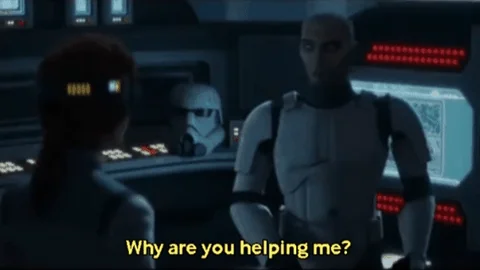
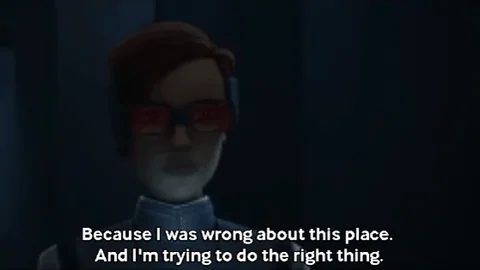
and how it got right what this scene kinda didn't:


(It was so close but then bad writing decided to undercut the moment with a joke rip)
And I think it's really interesting that these characters who were more or less raised into the Empire/First Order and chose to leave it are all directly asked why.
But take a look at Crosshair's answers in comparison:
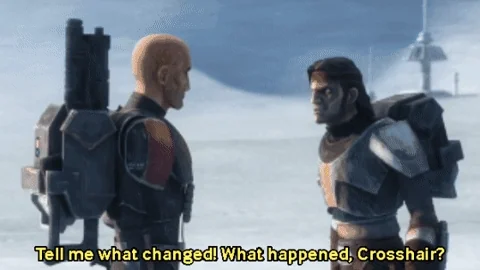
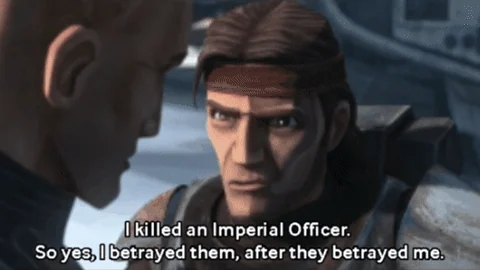
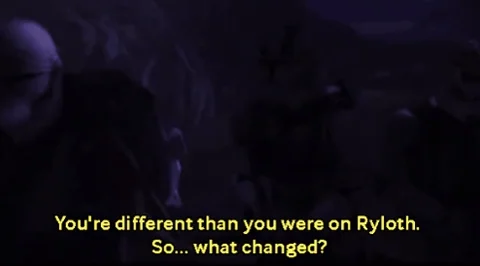
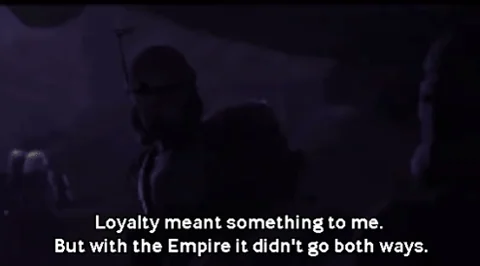
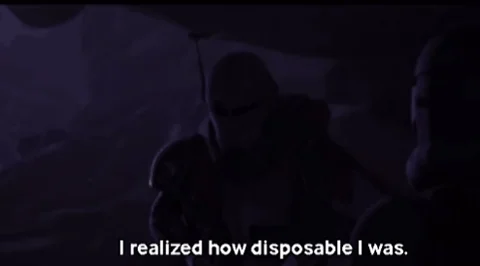
Different context for the asking, yes, but still, compare that to clones like Howzer, Cody, Slip and Cade who left or turned against the Empire because they knew what the Empire is doing is wrong and they weren't just going to blindly follow orders:


Crosshair - Loyalty, Purpose, and Survival
Crosshair didn't choose to join the Empire (though the show isn't very clear or consistent about how much control the inhibitor chips have) but he did, for whatever reason, choose to stay. By the end of S1 we know his chip has been removed and as he definitively says "This is who I am." There were likely still other influences on his decision, but listen to how he talks about the Empire in the S1 finale:
Hunter: Crosshair, I've seen what the Empire is doing. Occupying planets and silencing anyone who stands against them. You know it's not right. Crosshair: You still don’t see the bigger picture, but you will. Hunter: Can't you see they're using you?
Crosshair: We’re not like the regs, we never have been. We’re superior. The Empire can’t protect the galaxy without strength, this is what we were made for. Think of all we could do, together!
Crosshair: You all are meant for more than drifting through the galaxy. It’s time to stop running. Join the Empire, and you will have purpose again.
Hunter: They destroyed an entire city! Crosshair: They did what needed to be done. Kamino, regs, the Republic, that time is over. The Empire will control the entire galaxy, and I am going to be a part of it. Hunter: Don't fool yourself. All you'll ever be to them is a number.
He undeniably knows what the Empire is doing, but he does not care. In fact it sure sounds like he actually supports it and finds self-meaning in it. Hunter spends those episodes trying to convince him it's wrong, he doesn't change his mind. In the end they offer him an out and he doesn't take it.
Wrecker: You coming with us? Crosshair: None of this changes anything. Hunter: You offered us a chance, Crosshair. This is yours. Crosshair: I made my decision.
The next we see Crosshair in "The Solitary Clone" (S2:E3) he follows orders and shoots the Desix governor, right after Cody heartbreakingly tries to do what's right and find a peaceful solution.
Cody: Tell me something, Crosshair. This new Empire, are we making the galaxy better? Crosshair: We’re soldiers, we do what needs to be done. Cody: You know what makes us different from battle droids? We make our own decisions, our own choices. And we have to live with them too.
After this (glorious!) conversation, Crosshair stays. Maybe this began to seed some doubts, but he actually smiles a few scenes later when Rampart assigns him another mission. It seems like for him it truly is as he said in S1:E1 (chip not enhanced yet but still influencing him enough for his brothers to notice he's acting strange):
Crosshair: Republic, Empire... what's the difference.
Crosshair: Orders are orders.
This unethical mission that finally pushed Cody over the edge does not change Crosshair's mind about the Empire, at least not enough for him to take action.
But what does?

Mayday: And here we are, the survivors. Combat troopers stuck babysitting cargo shipments. Crosshair: Mission’s a mission. Mayday: Yeah, I used to say the same thing.
Mayday: After all the clones have done, all we’ve sacrificed. We’re good soldiers, we followed orders. And for what?
This mission has nothing to do with how the fascist Empire treats the galaxy, it's about how they treat their soldiers. It's about how Mayday loyally fought and served his whole life and Lieutenant Nolan let him die
Lt Nolan: He served his purpose as a soldier of the Empire. Crosshair: You could have saved him! Lt Nolan: Perhaps you didn’t hear me, he is expendable, as are you.
Crosshair thought he could find purpose within the Empire, and Nolan shows him exactly what that will be.
His turning point is accompanied with this powerful visual of the ice vulture, a symbol (and threat) of death, and also set up within the episode a symbol of survival:
Mayday: Vicious creatures, but you have to admire ‘em. They find a way to survive.
This critical moment (that gives me chills, oof this episode is a masterpiece!) comes right after Nolan calls him expendable and directly threatens him:
Lt Nolan: And if you speak to me again with such disrespect I'll see to it you meet a similar fate, clone.

then Crosshair sees the vulture's shadow and turns to Mayday's dead body (ahh visual storytelling my beloved) then makes his decision:


Crosshair turns against the Empire not because he believes Hunter was right about this:
Hunter: I've seen what the Empire is doing ... You know it's not right.
but because he was right about this:
Hunter: All you'll ever be to them is a number.
Redemption (both in fiction and irl in my humble opinion) comes with making amends and reparations (which is why death 'redemptions' bother me so much but that's a rant for another time). Unlike Emerie, Crosshair never explicitly denounces the Empire or his own actions within it. He never says anything to specifically show if and how his views have changed from what he said on Kamino. He makes amends with his family (sending the warning message, helping Omega escape, making up with Hunter) but that's about it. The most we get in terms of acknowledgement is this:
Crosshair: I thought I knew what I was getting into with the Empire. I thought I was being a good soldier. Hunter: Nobody really understood what was happening back then. Crosshair: I’ve... done things. I’ve made mistakes. Hunter: I have regrets too, Crosshair. All we can do is keep trying to be better, and who knows there just might be hope for us yet.
Which is nice and all but it's more about them making up as brothers so it's way too excusing tbh ("no one knew what was happening back then" ummm? "The Empire will control the entire galaxy, and I am going to be a part of it" remember? And even if at first Crosshair was being controlled by the chip, the fact that he chose to stay after it was removed* means he condones and is therefore still accountable for those actions).
There's also a bit of self-destructive guilt:
Crosshair: Omega, don't risk anything for me. I belong in here.
Crosshair: Omega needs you both. So I’m doing this alone, it’s what I deserve. Hunter: Don’t even think about plan 99, Crosshair. Omega needs all of us.
(which thank you Hunter for pushing back on the death redemption bs and oh look is that a wrap up for the purpose thing?)
But there's no action taken on his part to make up for what he's done or to stand against the Empire (aside from the bare minimum of help with Tantiss, only after it became personally relevant, which like yeah he had trauma to deal with but still).
While I do think the implications/follow-up of Crosshair's turn should have been handled better in S3 (like rip Howzer! he deserved an apology, but that's a rant for another time), I don't necessarily** think this arc is a bad writing choice. It's just saying different things than we expect:
Maybe Crosshair's story is not about standing up against an unjust system, like we see with many other characters (who deserved more screen time but that's a rant for another timeeee). Maybe his story is about how even those who are loyal to the Empire, who actually believe in it, still suffer under and within it's rule. Not to garner sympathy, but to show that there is no winning.
Crosshair has another 'so what changed' convo in S3:E14 with Rampart, in which they draw parallels to each other:
Rampart: You used to believe good soldiers followed orders. Crosshair: Depends on who's giving them. The Empire betrayed us both. Rampart: And you think you can fight them? That's not you. You're like me, loyal to no one but yourself. Crosshair: I've changed.
(note how he says who's giving the orders, not what the orders are)
"Loyal to no one but yourself" describes Rampart much more than Crosshair, since we often saw Crosshair pride himself as a loyal soldier of the Empire whereas we saw Rampart abuse power to be self-serving within the Empire (like when he killed Wilco to save face). But they were both betrayed either way. Vice Admiral Rampart, snively Imperial opportunist through-and-through, shouts "I was following orders!" as he is arrested for the Empire's purposes.
Even Hemlock, the final boss immoral Imperial scientist, who has to be benefiting the most from this system, echoes the expendability idea:
Hemlock: What I am working on is beyond your understanding. Something so vital to the Empire it makes me indispensable.
Then there's CX-2, also set up as a parallel/foil to Crosshair (fight me), who in the end is discarded as no more than a weapon, a tool that served it's purpose, showing us what would have become of Crosshair if he had stayed.
There is no winning in the Empire. Loyalty is not rewarded, it "doesn't go both ways." Everyone has to fight for their value. Even high ranking individuals** who for a time benefit from the injustice, in the end are just pawns to be used up and cast aside at a whim for the Emperor's gain. Even people who are motivated by self-interest alone cannot survive within this system, the only viable option in this galaxy is to fight the Empire and dismantle that system. (unless you conveniently find a magically safe island to hide away on but that's a rAnT fOr AnOtHeR tImE)
Which brings us back to...
Emerie - Cooperation, Compassion, and Choice
(Okay this post has already gotten away from me but I still want to talk about her to show the contrasts.)
Emerie may not have been given a lot of screen time to really flesh out her development, but there is a lot that is pretty clearly implied with her:
Crosshair: They’ll never turn her [Omega] over. Hemlock: They don’t have a choice. She is a clone, and therefore Imperial property. *Camera cuts to an angle more centered on Emerie’s face*
Crosshair: Give me your access card! Emerie: It won’t get you outside!
Emerie: I tried to warn him what would happen if he did not cooperate with the Doctor.
Emerie: Prisoner? Omega, you are no such thing. It will take time to adjust, but you will acclimate. It is far safer in here than out there.
Emerie: You should go back to your room. Crosshair: You mean her cell?
Emerie: Why children? Hemlock: Children are easier to attain and more agreeable to the subjugations. They are unaware of why they are here and what they possess.
Emerie: They're children. Like I was... Was your plan to discard them too? Nala Se: The Empire will keep them in order to control them.
We don't know a lot about Emerie's background, but it's clear that she had a lot less choice than Crosshair and less opportunity or ability to leave. Unlike Crosshair, we never directly hear Emerie's views of the Empire (and she was most likely 'taken under Hemlock's wing' before the Empire even came to power), but lets look at how she talks about the Tantiss:
"Remain calm. Cooperate and you might survive."
"Don't make this worse, Crosshair! There is no escape!"
"All of us serve a purpose here."
"The Doctor will inform me, if it's necessary."
"It's best not to ask questions."
"Escape is not possible, Omega. This is for your own good."
She honestly does the best she can within the system she is also trapped in. She tries to help Crosshair, Omega, and the vault kids in the only way she knows how (warns Crosshair about the hounds and security, tries to protect Omega from Hemlock, tells Scorch his "actions were extreme" with Jax, insists on overseeing Bayrn's retrieval, double checks his m-count (to give him an out), and tries to find out where he came from). When she gives Omega, and later Eva, the doll, I think it shows just how little she really is able to do here (and it's kinda heartbreaking imo).
The framing of this shot especially (after Jax's escape attempt) visually shows how Emerie herself is trapped/imprisoned:

Despite the fact that very little of this is Emerie's fault, she has very little power and she is doing all she can, the narrative does not excuse her role in the Empire:
Nala Se: What will you do, Emerie? Emerie: There is nothing I can do. I don't have that kind of power. Nala Se: Don't you?
Emerie: I- I was doing my job. Echo: Yeah, I’ve heard that before. You’re a clone. How can you be part of this?
These fighting-the-Bystander-Effect conversations parallel these exchanges:
Hunter: We made a choice, and so did you. Crosshair: Soldiers follow orders. Hunter: Blind allegiance makes you a pawn.
Crosshair: We’re soldiers, we do what needs to be done. Cody: You know what makes us different from battle droids? We make our own decisions, our own choices. And we have to live with them too.
which did not change Crosshair's mind. And honestly, all respect to Echo's disappointed mom glare™ but I think it's clear Emerie had already made her decision, she just needed help to actually be able to do anything about it. When she stopped Echo, with her voice wavering on the verge of tears (ahhh v good voice acting), she clearly had no intention of turning him in. She's on her own in the Empire's most secure facility with very little resources, if she had tried anything on her own she most likely would have failed and been killed
Omega: Emerie, you don't have to do this. Emerie: (sigh) I’m sorry, but I do.
but as soon as she is enabled by an ally, she immediately turns around to help: giving information and getting Echo through security, helping the kids escape, and giving Omega the tablet that allows them to free the other clone prisoners.
Where Crosshair's turn is accompanied by the symbolic imagery of the ice vulture, Emerie's is the removal of her (literally rose-tinted!) glasses:

Symbolizing how she has shed her previous views/indoctrination that altered her perception of the Empire and blinded her to it's wrongs. It's disillusionment.
Emerie's story shows us that even those who are raised and indoctrinated into this system can, should, and will escape (with needed help). Even those who did not choose to be apart of the Empire and are not making the decisions still have the responsibility and ability to act on what they know is right.
Emerie, whose name means 'Home strength' 'Brave' and 'Powerful', and "reflects the importance of leadership and authority in the workplace".***
While Emerie is only in one more scene after her turn, so the wrap up is a bit rushed, she still very simply does what Crosshair does not:
Emerie: Because I was wrong about this place. And I'm trying to do the right thing.
Echo: I’m sure Senator Chuchi would find what you have to say very helpful for our cause. Emerie: I have a lot to make up for. I’d like to help out however I can.
She admits wrong, takes accountability, commits to making amends, and leaves with Echo to go take on the Empire (which hopefully we will get to actually see more of some day).
So, in short, she's showing us how redemption is done right!
---
Notes:
*Whether this writing choice was good/logical/in-character or not is another discussion entirely, but I'm going off of what we were given, what the show is presenting in the canon text and (reasonably inferred/intentional) subtext. Crosshair is pretty multifaceted and I could only touch on so much here. There's a lot of ways to interpret his character/choices, but I tried to avoid the realm of speculation or fanon explanations (even if they sometimes make more sense lol).
**History and political theory are not my area of expertise at all, so I have NO idea how well this aligns with real-world fascism stuff and therefore what implications this storytelling choice could have. I think the message of like 'if you think you could survive or gain power by doing what the Empire/fascist system wants you are wrong' could be good (like how everyone is actually harmed by the patriarchy type of a thing), but I hesitate bc maybe there are those who would benefit, since it's a hierarchal system, right? If anyone more knowledgeable than me has incite to share, by all means
Either way, I do think it works in-story and in-universe though. It's just in the execution. The main problem (even from a strictly theme/character arc stand point) is the lacking follow-up/consequences for Crosshair in S3. Like you gave your character accountability by removing the chip and I think that's great setup for an arc but you gotta follow through with that and actually hold him accountable!
***I'm always curious when clones have 'normal' names, like why did they chose the name Emerie of all things? So I looked it up. Idk how reliable sources are for name meanings so take it with a grain of salt but it's still fun. Fits pretty well, and clones names have definitely had significant meanings in the past (like how Rex and Jesse both mean 'king') so I'm pretty sure it was intentional.
Anyway, thanks for coming to my tedtalk
#sometimes i feel like i'm reading too much into this show and giving the writers more thematic credit than is due#the pieces are defo there but there's a difference between finding it through analysis and reaching through OVER analysis#i think there's ways they could've solidified these things within the actual text and subtext if it's what they were really going for#and they could still have executed them better too#the cx troopers are a good example of that#they clearly were doing parallel stuff but the plotline didn't resolve well enough for that to actually work or really mean anything#also why is this one character SO complex while wrecker (who technically has more total screen time) has like no development whatsoever?#like don't do an ensemble show if you can't balance all the characters#additional tangent on this already long af post that just got longer lol:#i believe that characters arcs in general should be ARCS#often times a story ends at the PEAK of an arc so we don't get to see the results of that change#and that exploration and aftermath is MOST important for redemption arcs ESP when people have been harmed#thats why the death redemptions bother me bc the character completely cheats out of ever dealing with the consquences#change is good and important and so are good deeds#but one ultimate sacrifice doesn't make up for everything they did and does nothing to help the people who are still affected#darth vader's death redemption works for me bc it was actually about Luke being right about seeing good in him and trusting their connectio#kylo ren's does NOT (though nothing worked in that film lol)#i was so mad when he died for this very reason bc i knew it was gonna happen and that's not REDEMPTION ugh#also why did they kiss ew#ANYWAY#redemption arcs#character arcs#tbb crosshair#tbb analysis#tbb critical#tbb's subpar writing#writing#writing pet peeves#atla#atla zuko
263 notes
·
View notes
Note
Oh I would love to hear more of your thoughts on Heimerdinger because all of my friends were like "aaw the poor guy, he was right about magic all along, Jayce and Viktor owe him an apology" and I'm like??? Heimerdinger literally does nothing to improve any situation ever! I was so hoping he'd learn his lesson under Ekko, but when he got stranded in an AU and just decided to stay there and permanently take over his other self's body and let his original timeline perish I was genuinely horrified by his complacency (again). TBH I would have really liked to see him confronted with the fucked up culmination of all the fiddling with the Arcane in person, because I think I wanted him to see that he was right, he was right and yet he didn't change anything in the end (I'd even argue that he gets away without facing the consequences of any of his failings, he escapes Jinx' bombs even tho he failed in politics and he escapes the Arcane Apocalypse even tho he failed as a guide to his pupils and Hextech safeguard.)
Heimerdinger is a super interesting character and I'm glad you asked this because the previous meta discussion got me thinking about him but I didn't really know where to begin. I'll try to break my thoughts down with some cohesion:
I do think Heimerdinger learned his lesson within the narrative but specifically with regards to his two demonstrated personal flaws. Heimerdinger's two greatest flaws within the narrative are:
1) A lack of understanding and empathy towards those with shorter lives
2 ) The way his immortality detaches him from actually living his life (which feeds into point 1).
This is going to get long though, so I'm gonna start picking apart what I see as Heimerdinger's flaws and his virtues and how those get addressed beneath a cut:
So as I said, I would argue that Heimerdinger's arc does address his core flaws. His moment of greatest personal cruelty is when he fails to recognize Jayce and Viktor's desperation and, instead of agreeing to help them and guide them to make their experiments safe in the face of their desperation for Viktor to live, he just tries to shut them down. He gets exactly what he deserves there.
Then, in the AU universe, he recognizes this and agrees to help Ekko. He then willingly sacrifices his own life to send Ekko back to the canon universe, where Ekko is instrumental in saving the day. That, I would argue, is Heimerdinger's redemption arc, and he needed a redemption arc.
Also, while he was in the alternate timeline, he learned how to live in the moment, which addresses his second flaw, which feeds into his first flaw. I don't blame him for not feeling urgency to return home, without Ekko, he had no way of doing so. It could be seen as complacency, or perhaps simply an understanding of the reality. Would that world have been a better place if he'd invented Hextech just for a shot at returning to his universe? I'd argue that he was trying to be selfless by not doing so, when we see how much damage Hextech did in the canon universe. I think he was simply at peace with a shitty situation for himself, rather than actively avoiding his responsibilities.
As for the other Heimerdinger, who knows! Was there even one? Do yordles only have one identity across the multiverse? Or was there an element of redemption in Heimerdinger choosing to take his alternate self out of the Council? We just don't know.
As for his political identity, Heimerdinger is super interesting there too. Technically, he's an immortal enlightened despot in Piltover as its founder. I think he hides this fact from himself by allowing a council of humans to sometimes outvote him, in a fig leaf over the fact he really doesn't have the right to govern a bunch of humans, and I think him getting voted out of the Council acknowledges and narratively punishes him for this fact. Piltover isn't as enlightened as he thought it was under his leadership, a fact he realizes when he goes to the undercity and realizes how blind he was. But I'd say those were his flaws, he was always blind and naive, not malicious. And I think the narrative punishes him accordingly by giving him a wakeup call that he was asleep at the helm. He doesn't deserve to be in charge anymore. Jayce was completely right to kick him out BUT, did things get worse without the peaceful, modulating view of Heimerdinger on the council? How would HE have voted for Zaun's independence? I'd be very curious to know.
And I think it should be noted, Heimerdinger does have virtues too! His caution towards Hextech is not only well-founded, he is 100% correct. I think people forget that Heimerdinger was never ambiguous on the subject of where Hextech would lead them, he was completely right that it corrupts, destroys, and lays waste to civilizations. There's no ambiguity there! He's completely correct!
He's also correct that there are scientific innovations that would be safer if they spent more time in testing before being made available to the wider world. It took 100 years for people to realize coal burning factories were measurably altering the world's climate. Another great example of an invention that should have been tested more before it was implemented was freon, which was used in early refrigerators and does measurable damage to Earth's ozone later to the point where it is now banned. What if instead more tests had been run?
Heimerdinger's long view of science is correct and in an ideal world, it'd be great if we could run these tests to their conclusions. However, the long view isn't the whole story, a debate that Arcane actively engages with.
Because it should also be pointed out: the refrigerator also helped improve people's health around to the world. Think of all the food and medicine that can be preserved today because of refrigeration! Literally thousands would have died if we had banned refrigerators until freon could be better studied.
That's kind of where Viktor is at vs. Heimerdinger. If freon-powered refrigerators can end hunger in the undercity, why aren't we applying it now? To which Heimerdinger answers: you don't know what else it might be doing to the world. They are in fact both correct! It's a debate! One the real world is still trying to figure out. Heimerdinger is an extreme case of the long view, and Viktor is an equally extreme case of the short view since he's frantic now that he has so little time to live. Jayce tries to balance the two and gets caught in the middle with everyone mad at him, poor guy.
Anyway, I think that covers most of what I had to say about Heimerdinger? Hope that helps!
112 notes
·
View notes
Note
Beetlejuice and Lydia (everyone grown and consenting of course) are similar to the dynamic of Nelson and Lisa yes?
oh you went for the throat with that one LMAO
i know why you're saying it but no, i don't think so. i guess it highly depends on which beetlejuice and lydia we're talking about here.
"to be loved is to be changed" is a fav trope of mine that i like to see applied to antagonistic characters because i'm a huge sucker for redemption arcs. i like to apply it to nelson and lisa, but i've also been applying it to cartoon beetlejuice's friendship with lydia because this works platonically too! and in a very sweet way i think. they might've introduced me to the concept actually, now that i think about it.
there's something very comforting about a character who's antisocial or generally disliked by everyone and hates everyone back...but has a soft spot for the one person who can stand them and sees the good in them despite their rough exterior. this person can be anyone; a friend (their only friend most likely,) a younger sibling, adopted or found family, a lover, a secret crush, hell even a loyal pet. seeing characters gradually change for that one person because they realize they don't want to let them down or just by positive influence, is SOOOO GOOODDDDDD
ok but circling back to your question. i know you said grown and consenting implying like a romantic thing but the only ones i could see having anything remotely close to a romance are movie bj and lydia and they...don't really have that type of dynamic at all. i don't think, at least. i haven't actually given it much thought. i've been seeing them a particular way for 20 years and now the sequel comes and flips the whole thing on its head so i'm trying to process that still. i've been working with their dynamic as close to the movies canon as i can, and in canon lydia doesn't see any good in him, actually, probably the opposite lol. he saved her daughter and kicked rory's ass but she still wants nothing to do with him. so they're out of the question for that type of dynamic.
so let's talk platonically because, again, it's a dynamic that works for any type of relationship imo. i think musical bj is a great candidate for "to be loved is to be changed" but not with lydia....because this lydia doesn't really care to "fix him" or anything. she's a bit wicked herself, so i'm thinking if he became "good" she would find him boring and wouldn't want to hang out anymore LMAO
so that leaves cartoon bj and lyds, which like i said, pretty much introduced me to the concept. i think lydia and lisa are very similar. bj and nelson are also both the type to laugh at others misfortune but kick your ass if you mess with the people they care about, while being softies on the inside. lydia and lisa both try to keep bj and nelson in line because they care about them (in lisa's case she's also controlling,) but sometimes they can be let down because of how untamable they can be sometimes. "to be loved is to be changed" but you can't try to change the one you love. the concept is only worth doing if the person who changes does so organically on their own, sometimes even without realizing. by the time they realize things are different, it's already too late, they're already too devoted to this person who somehow managed to make them less of a piece of shit.
to sum up, yes they are similar, specifically in the cartoon, but not in a romantic way. and yes i have a huge soft spot for this trope
154 notes
·
View notes
Text
#i can and will die on the hill that ned little - the actual lt. little of the show - is as far removed from the sad wet doormat of a man#that fanon likes to portray him as; as humanly possible#the closest correlation between fanon!ned and actual canon!ned is his prolonged misery and level of worry-induced distress#he's more than competent - we see it time and again throughout the first half of the show#but the biggest indication of this is crozier himself handing little his pistol when he goes into self-imposed rehab#HE WOULDN'T DO THAT IF HE DIDN'T THINK EDWARD WAS CAPABLE OF HANDLING THE SITUATION.#crozier's not a man to mince words or spare feelings - if he thought little unequal to the task he would've handed his pistol to fitzjames#instead; but no. he chooses edward precisely bc he knows edward is loyal and steadfast and capable of doing what needs to be done
#edward is the one who falters in that scene; not bc he's too overwhelmed to cope but because he knows exactly what is at stake if#anything goes wrong during crozier's convalescence; the lives of a hundred+ men turning on a dime should crozier not survive his withdrawal#and he's not wrong to feel daunted by the task! it's an immense amount of responsibility -#one crozier himself bowed and buckled under the second leadership of the expedition was thrust upon him! it's a terrifying situation;#but edward still steps up and in the wake of francis's seclusion; for once; things actually go somewhat smoothly!#the men are faring better without the black cloud of crozier's alcoholism and negativity hanging over them like a shroud;#he's gotten fitzjames off his back for the most part; other than for carnivale. and even here we see edward's diligence and commitment#to his position as first lieutenant of the expedition bc he's the one questioning using vital supplies for a party! he's the one#who agrees that the men need the distraction; but worries if they can afford to foot the bill later;#when things will be more difficult! that is the kind of mindset francis himself displays at the beginning#of the show when he's questioning sir john's decision to press forward despite every sign imaginable telling them not to!#EDWARD WORRIES FOR THE MEN THE SAME WAY CROZIER DOES
#what trips him up; what ends up driving a wedge between him and crozier; what causes little to fuck up the armory situation; is this:#crozier himself. bc francis was a mean drunk. and while in his cups he treated little as no better than a ship's boy; running menial errand#and very literally risking life and limb to indulge the vices of a man who treats him with open contempt (and let's be clear; that man isn'#the captain edward has come to know and respect since they set out from greenhithe - no; that is a stranger wearing his captain's face;#making choices that leave edward feeling frustrated and helpless and enraged)#what crozier's belittling of little's station and rank does during this time is make him deeply insecure of his own purpose and competence;via @boogiewoogieweeb
listen i don't think edward little was actually a bad first lieutenant. when we see him in the first episode he's calm and confident. he does not say much but he's amiable enough. crozier likes him, and i don't think crozier would like anyone he doesn't think capable in some way. generally he's dependable and knows what he's doing. however unfortunately for edward he has these qualities because he has a major case of eldest daughter syndrome, which means he both wants to please his mum (crozier) and has an overdeveloped sense of responsibility for his younger siblings (crew), so when they get stuck in the ice and crozier starts going (more) alcoholic, he enables his mum bc he doesn't want to disappoint her even if he doesn't agree with her, and he has to pick up the tasks and care for his siblings she's not doing, but he can't let his siblings know about their mum's situation because they'll get worried and restless. and like a true eldest daughter he has to bear the brunt of mummy's anger for being a disappointment but he also doesn't want to seek refuge with the man she divorced (fitzjames) because that feels like a betrayal. also while this is going on there is a giant bear who hunts his siblings for sport so they're dying left and right and also a changeling master manipulator who's making his siblings mad at their mum and who wants to fuck said mum before eating her like some sort of praying mantis. anyway i think i would start being miserable and anxious too.
#i think you hit the tag limit or something bc your last tag cut off halfway through but THESE TAGS ARE SO IMPORTANT TO ME#it's like i love crozier as much as the next person#but also the way sometimes he's talked abt in fandom as if he's never done anything wrong while HE is for a large part responsible#for the ill will that a considerable part of the crew starts to bear against him and command in general#bc he's a mean drunk who makes bad unjust decisions#hickey should've been flogged. but the exact sentence and the execution of it? an unfairness that everyone on that ship would've felt#and who has to deal with the consequences while crozier is shutting himself off? his lieutenants. and edward first and foremost.#of course crozier has his redemption arc and when he does he becomes the best captain they could've asked for.#but he's lost respect from part of the crew forever already by that point.#and i always question to what extent crozier actually told edward abt his suspicions of a mutiny. bc he vagues abt it to him.#but we never see him lay it out specifically. and idk man. crozier counts on edward's loyalty but sometimes i wonder#if he ever confided in him in full. and if edward felt that. and if that made him feel inadequate to the task before him (i.e. to lead)#especially in crozier's absences when the camp becomes a powder keg.#i keep thinking about that armoury moment bc i remember someone saying that crozier told ned not to act unless the situation changes#or something. and then the fog comes in and the situation changes. and everyone is on edge#and they corner edward and they manipulate him. and i always feel like edward knows very well they're doing that#they're not being particularly non-threatening about it either - he's alone and there's more of them#but also. HE is in that moment responsible for all men in the camp. he has no time to go look for jfj.#they may be lying to him; they may be right and if he doesn't give out the guns men may die#and crozier will come back to his failure to protect the men.#again. it's ned being torn between loyalty to crozier - duty to the men in the most stressful situation ever#irks me that he's called in and treated like a scolded child by three men who were not there?#of course he needs a reprimand bc in the end he made the wrong decision. and he shouldn't have let the mutineers manipulate him#but it's the way they go abt it. the humiliation of it.#need to rewatch to say more abt it but i have a lot of thoughts on the whole situation
362 notes
·
View notes
Text
Okay so, Crosshair’s hand.
Has anyone pointed this out? When Crosshair kills Nolan, he doesn't use his shooting hand.
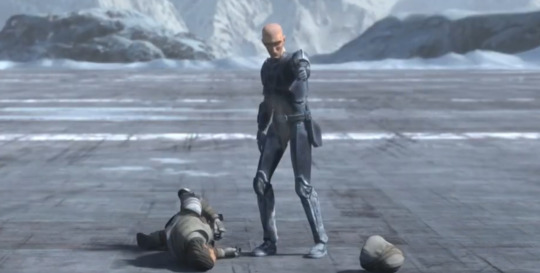
He uses his left. Just as he very significantly has to in the series finale.
I don't know if the writers knew as far back as "The Outpost" that Crosshair was going to lose the use of his shooting hand and by extension everything he believed made him strong, a "superior" clone, and safe from being discarded when he was kind of fascism-pilled. But it feels extra significant in retrospect that his first action taken against the Empire is not done with the hand associated with the terrible things he did as an Imperial sniper. And it's after he just got a difficult lesson about how his own personal strength and skills aren't enough to protect him - he was saved twice by Mayday, then possibly only survived through the night because he wouldn't leave him behind and could share his body heat. He may be using his left hand when he shoots Nolan because his other arm is tired from supporting Mayday all the way back, which only adds to the symbolic touch I love that Mayday is using his rifle as a crutch to help him walk as well (and of course, he's at close range so quite meaningfully Crosshair doesn't use the rifle to shoot here either). It all supports the idea of this as the first huge moment of transformation for Crosshair when he's finally turning his fire on the real enemy out of a desire to protect others, however futile and too late it is in this particular situation.
Going back and noticing this really reinforced for me that Crosshair's hand injury probably isn't just meant as a manifestation of his trauma related to Tantiss. It would make sense considering it's his shooting hand that it also has something to do with his inner conflict regarding his changed relationship with violence and killing.
The Batch were introduced as these stereotypically macho soldier characters, an impression that's softened a little as early as the pilot of TBB but still distinguishes them a little from other clones. In a kind of funny way you can look at the whole series as being about these guys who were only brought up to fight gradually discovering and finding peace with their more traditionally feminine sides - literally because of Omega, a female version of themselves who shows them the possibilities of being a family and living for others instead of for violence.
For Crosshair this journey is much more difficult and like a painful rebirth than it is for anyone else because being a soldier was so much of his identity. He's always been the one to most pointedly distinguish his squad from regs because of their "superior" traits that he thinks will make the Empire value them, and he clearly internalized the way the Kaminoans only care about clones as weapons to be used in war. And it all betrays how little value Crosshair actually believes he has deep down. It was easy to go into S3 being especially worried about his fate because he's believed so long that he's not good for anything but fighting and he's the character it was the hardest to imagine adjusting to a different life.
But in retrospect, it was stupid to think they'd let him off that easy and of course the whole point is that it takes a lot to get him there. What exactly he went through on Tantiss beyond the electroshock torture we've seen is never delved into but personally, I think being a soldier is something that's poisoned for Crosshair after he becomes a victim of the Empire himself and subject to their attempts at reconditioning. He's not psychologically able to be that person anymore, but for a long time is still trying to largely rely on himself and his own strength. He tries to sacrifice himself for others because he's still holding onto that part of himself in a way.
But for once in Star Wars we've gotten a fully realized redemption arc showing that sometimes what's harder than giving your life in a redemptive way is to actually have to figure out how to live with the bad things you've done and be better. Some of the people Crosshair hurt were his family, and he has to learn he can only make things better by being there for them. He has to learn that he actually can survive and figure out a way forward from his life as a soldier if he lets himself rely on them, just like he only survived Barton IV with help from Mayday. As @moonstrider9904 explains so well in this post, that is what's so important about Crosshair losing the hand and making that final shot to save Omega with Hunter's support. Symbolically he's had that toxic part of himself actually cut off and it's the final, most painful part of his rebirth. But because of that he's forced to find that he can live on without it, that he's surrounded by people who love and believe in him anyway, and that having superhuman skills as a killer was never what gave him worth.
No, having his shooting hand cut off doesn't "fix" anything or mean that Crosshair is healed. He's probably only begun to recover from everything he's been through. But all we really need to see is that he's firmly found his place as part of a family instead of a squad, and he's not going to be alone as he deals with all of that.
319 notes
·
View notes
Text
I keep seeing posts about how Jason should have chara development that makes sense regarding his morals and stop killing because of that rather than because Bruce told him to stop and like - it's not like I disagree. Of course, that would be great. Of course I want him to be written his age by writers that like him and have development that makes sense and work with Bruce and Dick and evolve on his own as a person.
But the thing is.
A few weeks ago I saw a critique of His Dark Materials that was so absurdly daft it made me want to peel my skin off. For context, His Dark Materials by Philip Pullman is a children/young adult book set in fantasy worlds that doubles as a retelling of Paradise Lost in which Lucifer wins, and criticism of christianism is preponderant in it. (This will spoil a good part of book 1 of HDM btw). I'm far from a HDM fan, I saw a few episodes of the adaptation and read it once when I was ten and thought the characters and world was fun but the rhythm in the 2nd and 3rd books was off and I didn't like the ending, so like it was fun but I definitely not a re-read for me. But the point is, this critique clearly had a degree in not getting the fucking point, because his arguments against the books clearly stemmed from an inability to shift his viewpoint out of the christian framework (I promise this is still a Jason post). One of his most ludicrous argument was the lack of character depth in HDM. This is particularly silly because one of the main characters, Mrs Coulters, is one of the most interesting complex characters I've ever seen in fiction. Now Mrs Coulters is interesting because she is a bad guy. Like, tortures and kills children level of bad guy. She doesn't magically grow to sacrifice herself in the name of martyrdom to repent for her sins or something silly like that; but still, she sometimes does very good, helpful things for the characters, because the tension between her character is between her ambition (and her faith though that's more questionable) and her motherhood, as she truly loves and cares for her daughter, one of the protagonists, and wants a better, safer world for her. Now the critique claimed that there was no character depth because there was no concept of sin and no redemption arcs in the books- but those are utterly Christian concepts, so of course they wouldn't be endorsed by a book that challenges their validity. Just because Mrs Coulters doesn't have a redemption arc doesn't mean she isn't deep; and the fact that she does good things not out of morality but out of love is what makes her a fascinating character.
So, thinking about that asinine critique, I was suddenly struck with the realization that Jason is somehow similar to Mrs Coulters in that he is a very loving person who tends to put his personal connexions above everything else (of course, he doesn't experiment on and torture children, that's not what I'm saying). My point is, I don't think why we shouldn't have a Jason who evolves not moved by his morals (though he has them and they matter) but by his love. The point of Death in the Family is Jason wanted to be loved and have a family and trying to shield Sheila's body with his and telling her he loved her. The point of UTRH is Jason doing horrible things in the most theatrical, strategically planned mental breakdown as begging for proof of love because he can't reconcile being loved in a different way that he loves and because he can't understand someone putting their moral code over love. And as much as RHATO #25 fills me up with dread, I have to say I love Jason's behaviour in that final stint. "I am my father's son" holy shit what a line. Jason is Willis' son and because of his filial love, his loyalty demands he avenges him. Jason is Bruce's son and because of his filial love, his loyalty demands that he does not kill. Jason almost murders Willis' murderer with a blank bullet and then when Bruce beats hims halfway to death he doesn't defend himself, doesn't fight back (like, one punch but come on, we've seen him fight, he just gives up). That right there? Hate to say it with how questionable RHATO's Jason is in general, but that's peak characterization. The conflict is entirely about Jason's conception of love, family and worldview, and it's deep and interesting and has nothing to do with morality. I want Jason storylines that explore that. I want Jason to work with the batfam in stories that make sense, I want the writers to acknowledge him as a victim and trauma survivor and allow him to grow from there instead of demonizing his mental illness, I want him to stop killing out of love and I want him to allow himself to love in healthier ways and for the width of his love to spread exponentially and for that to affect his behaviour and worldview.
And that's not just because I like Mrs Coulters and dislike the idea of holier than though moral characters! The christic symbolism Jason is crystal clear (especially in Lost Days), but it's not just about Jason: Talia is associated with Mary (which makes sleeping with him that much more obviously incestuous and horrible and ooc), Joker is the Devil and Bruce, of course, is God (which begs such interesting questions about the Holy Spirit - Robin maybe? To explore at a later date). Now, everybody's experience with Christianity differs wildly, but the way I learnt it growing up in catholic culture was basically God being an Authority of Judgement and Law, strict and all about morality; while Jesus is about love, unconditional love, even and especially the sinners and the damned (and as for the devil Lucifer is a fallen angel who fell after losing to God, and Satan is the demonic incarnation of temptation ain't that interesting). So I would argue that by having Jason kill or not kill out of love for his family, Jason is already his own character with autonomous thought process, independent morals and original interesting values that are a breath of fresh air in the world of superhero which is all about moral codes. Additionally, I think it's interesting and full of potential (and hope) that that very thing is why Jason and Bruce are held in opposition so often when in christianism they are two sides of the same coin.
TLDR: Jason going through character development that doesn't involve an evolution of his moral code is a great idea and if executed properly should give us fascinating stories with one of the most interesting characters in the DC universe, I used to think he should get a sort of "redemption arc" after UTRH where he questions his moral code but now I feel like I'm stuck in the same Christian/superhero framework as the pedantic guy who didn't understand His Dark Materials and I refuse to agree with them about anything so now I'm a hardcore "love over morals" Jason girlie. Obviously I still think moral code development would be a good and interesting storyline and better than anything DC is giving us rn, but I think we could do even better without it.
(also Star Sapphire Jason ftw)
#jason todd#red hood#jason todd meta#rhato 25#under the red hood#red hood and the outlaws#red hood lost days#batman#dc#batman and robin#his dark materials#star sapphire jason todd
197 notes
·
View notes
Text
Okay, so, I need to talk about the relationship between Persona 5's ending and Persona 5 royal's ending, because I think it isn't discussed enough how one puts into question the themes of the other and in doing so it elevates everything that came before.
Spoilers are coming, you've been warned.
The main thing that's given me an outlet to think about this is a few quotes from the Phantom Thieves when they're in the Velvet Room after being Thanos-snapped by Yaldabaoth. Specifically these quotes:
Ann: "I... I never want anyone to have to go through what I did!"
Yusuke: "Just as art is meant to break boundaries, people should be saved even if they frown upon it. I won't allow the justice I believe in to be shaken any further!"
Ryuji: "We're doin' this to make sure people don't go through the same crap we did. It doesn't matter if they think we're just or not. We gotta do what we believe in!"
Futaba: "I can't let people suffer like this, even if I don't know them personally"
They mention some core ideas: 1. They want to prevent people's suffering because of the suffering they've felt. 2. They must do this regardless of if people want it, because they think it's the right thing to do. 3. Their justice is worth fighting for by virtue of being what they believe in.
Does this seem familiar? Maybe makes you think of a certain therapist who shows up in Royal?
I think Takuto Maruki serves a decent amount of purposes narratively and thematically, but one of the most genius things about him is that he serves as a foil to both the Phantom Thieves and Akechi, and in being that foil, he is, deep down, following the principles that the Phantom Thieves fought for - In the end, it was largely Joker who inspired him to fight for his reality.
Maruki fights for a reality where suffering straight up doesn't exist, because he doesn't want anyone to feel the suffering he's had to endure. Maruki wants the Phantom Thieves and Akechi to never feel suffering anymore, regardless of their stance on the matter. He is "saving" them regardless of their wishes, and will fight them to keep the reality he wants. He thinks the world is unfair, so his "justice" is to make a perfect world for everyone - and that's what makes it worth fighting for, because that's what he believes.
Maruki's rationale to fight against the Phantom Thieves and Akechi is (partly) the same reasoning that the Phantom Thieves use to regain their motivation to fight the Holy Grail/Yaldabaoth.
So, narratively, Maruki serves as a mirror that's telling things not to be told for the Phantom Thieves to look into and to see the ugly parts of their own way of acting. Can they really fight Maruki, knowing that he is just acting how they did?
I see people sometimes refusing Maruki's reality because it "wouldn't actually work" or "it's imperfect". But as far as I'm aware, it's imperfect because it hasn't been completed yet - I think the game is a lot more interesting under the pretense that Maruki truly has the power to erase all suffering, once his reality is complete, past the deadline. I also see the argument, and even the game uses it, that Maruki's world "isn't reality". But did we listen well to Morgana's speech before he disappeared in the Yaldabaoth arc? The world itself is made up of cognition, reality is born from the points of view of everyone. Maruki *can* change reality, and the real question of the game is not about the logistics or "ontological dignity" of his reality, but rather - Do you want a world where all your wishes are granted and no suffering exists?
In the end, the game shows the Phantom Thieves that "sticking to their justice" will make them fight against people with similar ideals as theirs. It's funny, in a way, how Akechi was the one fully willing to fight Maruki from the start. His rebellion has always been more individualistic in nature than the Phantom Thieves' - he wanted revenge for himself, then redemption for himself and now he wants a reality where he isn't under anyone's control anymore. To him, Shido's country, Yaldabaoth's ruin and Maruki's world are all the same - Maruki just has a nicer, more therapy-speaky way of presenting his proposal, and sees people as his equals rather than as insolent masses, but his goal is the same. They're all worlds that shackle you for the "greater good". And in the end, Maruki, and Royal, force the P5 gang to become more like Akechi - to value their individuality in the face of the public's "justice".
To fight for what you believe in you will face people with the same determination as you. They will be your equals in many, many ways. In the end, you can only stick to your guns and hope that what you believe in is worth more than what they believe in.
I have a lot more to write about these topics but I'll leave it there. Maybe about the relationship between Maruki's reality and individuality next? That could be fun ^^
Btw - Special thanks to @thedaythatwas for inspiring me to write up stuff about Persona 5 Royal!
#persona 5#p5#p5r#persona 5 royal#persona 5 spoilers#takuto maruki#dr maruki#p5r maruki#akechi goro#goro akechi#writeup#damn this turned out long as hell
347 notes
·
View notes
Text
this is such a random thing but I love the message in the ii finale that redemption does not necessarily mean forgiveness. The person who did the harm may choose to change their ways, but ultimately it's the people affected who choose whether or not to accept that and continue to have a relationship with them. and there's no judgement about which decision is right or wrong, nobody's going "oh they don't deserve a second chance and you shouldn't give them one" or "you should go easier on them, they've changed" because that's not what it's about. like, here are some examples of what I mean--





we see that suitcase outright says she does not want to be friends with nickel. which is fair! she was really badly affected by his actions, and unlike balloon, she didn't have season 3 to process those feelings. but at the same time, she doesn't seem to hold it against him that he's friends with nickel now, nor does he hold it against her that she doesn't want anything to do with nickel. they both end up in places that make sense given their specific arcs with nickel, and make the choices irt him that are best for them.
similarly, taco ends the show on good terms with microphone and not with pickle. I must admit that I find it kind of satisfying that I predicted this was how these relationships would end up---taco has tried and failed to make amends with pickle a lot of times, but because of how she hurt him, he just can't forgive that. besides, the taco he had a relationship was entirely fabricated, so he couldn't get that back even if he wanted to. with mic, her issues with taco were less about anything specific taco did to her and more about the way that taco messed with other people, and encouraged mic to do the same, so it makes sense that once taco proves that she does not want to do that anymore, mic would be willing to pursue a friendship. and, unlike pickle, taco was much more upfront about her true nature with microphone, so it's not like everything they had before was based on lies, and they have something to build on.
and even though she herself is cool with taco now, mic also understands why pickle isn't! here we see she encourages taco not to dwell on the fact that he doesn't want her in his life. it also ties back to what she says earlier--"you did a bad thing. you don't say sorry to make it better, you say sorry because it's the right thing to do." the point of changing for the better should not be to regain the relationships you lost when you hurt people---it should be to not keep hurting people, and if they do or don't forgive you, that's their prerogative.
hell, we never even find out explicitly how marshmallow feels about knife at the end. and that's fine, because he didn't save her to change how she feels about him, he did it because someone needed to do it. I don't think outright addressing it would make it feel any more satisfying, because that isn't the point.
and by the end, it seems like everyone kinda stands in different places with mephone. and he realizes that him being around would probably just make things worse, so he makes the decision to leave them be. that seems like the best way for things to go---sometimes you can understand why someone hurt you, and you don't hate them, but it's better for both of you that you go your separate ways.
and then, sometimes, there are just the worst of the worst. the people who seem to live to exploit and abuse others, who care only about getting what they want, and will beat down countless people to get it. the people who have ample opportunity to change and yet refuse again and again to do so. the people who have unfathomable amounts of power that they absolutely should not.
the steve cobs of the world...well, they make damn good popcorn.
79 notes
·
View notes